As an entrepreneur, you want to help people solve a problem that you authentically give a shit about, while making it rain dollar bills all up in your grill.
In your quest to make this happen, you might have thought about creating a community, but you aren't sure it's right for your business. You're scared to death of doing it wrong and ending up wasting hours of your time (that you don't have) “engaging” people without actually profiting from it.
That's right. You might believe that you should set up an online community so you can “engage” your audience…cause….any engagement is good engagement right?
WRONG.
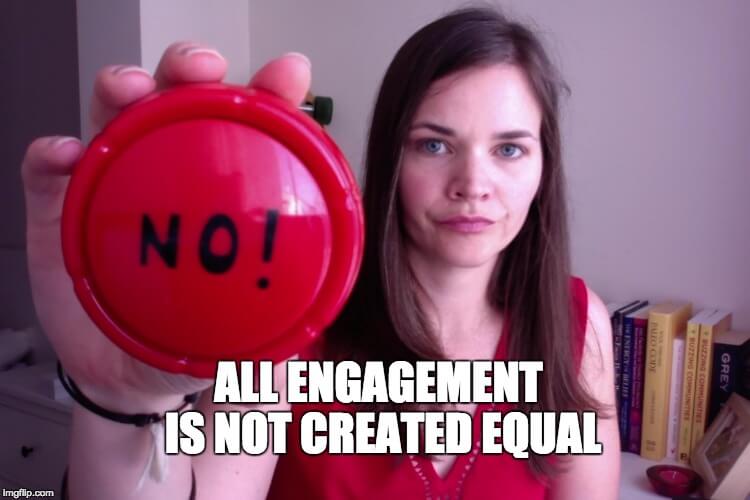
All engagement is NOT created equal and if you dive into building an online community with the goal of “engaging” your peeps…then just stop right here.
Save yourself the time and money.
Or if you like, grab a fist full of cash, light it on fire and stand there for a month. You may as well burn your money and waste your time because that’s exactly what you're about to do.
Now, if you'd like to put money IN your pocket (and not in flames) and save yourself some time for other important parts of your business…this guide is for you.
When you finish reading this guide, you will be way ahead of all the other wantrepreneurs out there who are going to slap up a free Facebook Group and channel their inner Kevin Costner.
“If you build it, they will come”.
Um…no dude. That's NOT how your movie is going to play out.
Storytime – Your worst nightmare from creating an online community.
Picture it.
You're a smart, talented, and all-around awesome entrepreneur. You've got killer products and services and you wanna spread the word. You see other big fish in your niche (and newbies for that matter) setting up free Facebook Groups on every digital street corner like they’re Walmart or Starbucks and so you think to yourself,
“Why not? I can bring all my people together in one place and they can connect and engage with each other. They can promote my products, sing my praises and drive buyers to my offers. I could set this up on Friday afternoon and be making bank by Monday”.
So you do it.
You go with Facebook because…um..well…you aren’t sure why actually…don’t ask so many questions Diana…you just do because everyone else is doing it that way.
And you load up Canva, quite possibly the best free graphic design software/app on the interwebs, and whip up an image for your free Facebook group cover photo. It's a bit fuzzy but your people won't care, they’re gonna be so “engaged” with each other and digging in their wallets for their credit cards that they won't even notice.
You pop a quick intro into the description but don't set any rules or guidelines, “I mean…we're all adults. You don't want to stop people from “engaging.”
Then you make a pinned post, so that you can invite everyone to post an introduction to the community.
Next, you write up a quick email to your list saying you created a cool free place for them to engage with one another…you click send and anxiously wait for members to join, post vulnerable stories and basically chant your name as they march to your sales cart.
24 hours later you have 7 people in your group.
WTF.
…and one of them is your mom.
No one has introduced themselves and one person posted “What exactly are we doing here?” before they packed up and left your group. Her greyed out name mocking you.
But you don't give up. You can make this work. You just need to work harder.
You create daily threads (cause that’s what you do), you start a challenge (cause those are fun), you start doing Facebook Lives to “connect” and speak to your people.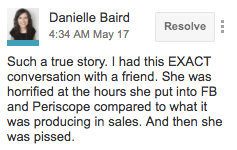
After a couple months, you have a group of 500 people…but something isn't sitting right. You have 500 people but how many of them are actually BUYERS?!
You step back for a moment and look at how much time you're spending on your community. You’re horrified. You're spending hours a day in there. You keep doing what you think is right, but nothing seems to hit or stick and you're pissed.
“Why aren’t they engaging? Why don’t they care? I don't want to have to post all the time and be so hands on! They aren’t even paying for this group! I've created a monster. I wanted a group that converts like a monster, not a monster that eats my time and energy for breakfast, lunch and dinner.”
You don't know what to do. You can't just close the group because people seem to really appreciate it (or can you?) but the time and energy that it takes is slowly sucking the life out of you.
So what's a savvy entrepreneur to do?
Well first…DON’T set up a free community right off the bat.
There I said it!
That’s right my eager beavers. That’s NOT the community you should be starting with. Focus your efforts on a community for one of your paid courses and later on a paid membership community.
I’m getting ahead of myself though, but I just really wanted to punch that mistake in the face. Maybe you could write this on a post-it and park it by your computer or your porcelain throne.
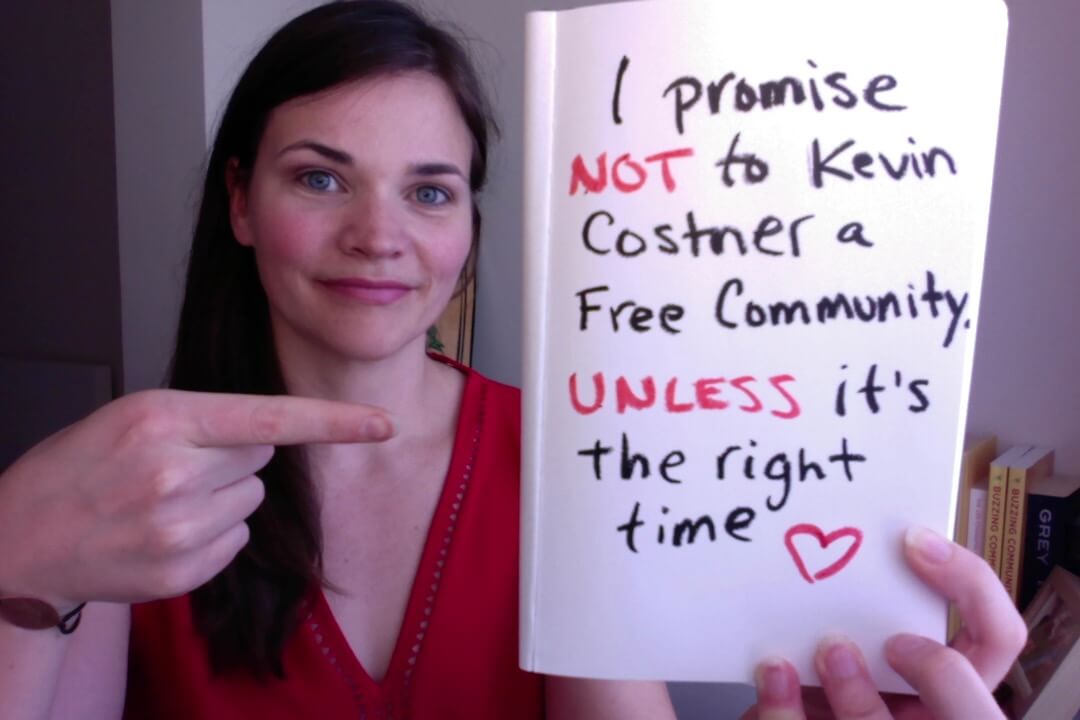
Done? Fantastic. Now that we’ve got that clear, it's time to approach online communities with a love child. A what?
You heard me. The community love child, that most people don’t even know about. Close your eyes and come on a journey with me. Ok…maybe open your eyes so you can keep reading but let’s use our imaginations.
Empathy and Strategy are two kick–ass people.
They have so much to offer the world but they feel like something is missing from their life. Strategy wants to make a bigger impact on the world and Empathy wants to connect with others on a deeper level.
One night, they both happen to go to the same bar and they hit it off.
After enjoying a drink or 5, they throw inhibition to the wind and make sweet sweet love. 9 months later…a new approach to online community is born.
Profitable Online Community Strategy (POCS)
You see…with only empathy and emotions, you don't serve your needs as a business.
On the other hand…if you are only strategic, you don't serve the human needs of your members.
Would you like to meet this bouncing baby POCS? Read on!
Your profitable online community roadmap and what we’ll cover in this guide.
Here's the thing. If you'd like your community to actually be profitable, you can't just wing it. You need to create a plan and a strategy that drives your #1 business goal.
In this guide, I'll be taking you up, waaaaay up, to give you a high-level, bird's eye view of what it takes to build a profitable online community from scratch.
This is not a quick and dirty guide. This is loooong…and strooooong…and down to get the friction on guide.
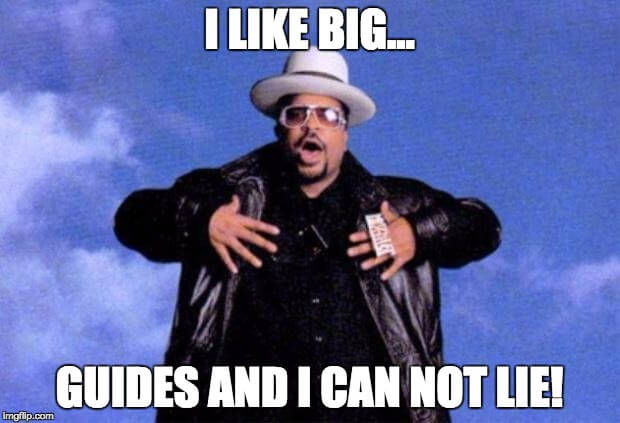
Just check out the table of contents if you don’t believe me.
Table of Contents & How to Get the PDF version of this guide
Chapter 1 — Why did I write this guide and who the heck am I?
Chapter 2 —When should you build an online community?
- An online community is NOT the first step of the online business ladder.
- Do my clients even want a community?
- Do I have the right personality to run a group?
Chapter 3 — Debunking the biggest community myths entrepreneurs have.
- Myth #1: “Free groups are a great way to start building my list.”
- Myth #2: “An online community will establish me as an expert”.
- Myth #3: “I’ll be in Facebook all day.”
- Myth #4: “My course is good enough without a bonus community”.
- Myth #5: “ I should replace my website with a Facebook page or group.
- Myth #6: “I’ll need to post 7.6 time a day, at 12:07pm”.
- Myth #7: “I’ll add my friends and family to “bulk up” the group”.
- Myth #8: “I can't start a community until I have 1,000 subscribers.”
- Myth #9: “I have so many things to do, I don’t have time for a community”.
- Myth #10: “Once I create a community I’ll be married to it for life”.
Chapter 4 — What kind of online communities are there?
- A community for students who buy a paid online course (On Facebook or Slack)
- A Free/Open Facebook Community
- Paid Membership/Subscription Community
Chapter 5 — What platform should I host my online community on?
- Why multi-million dollar companies choose to use Facebook
- The difference between a Facebook Page and Group
- Pros and cons of open, closed and secret FB groups
- #1 thing that makes Facebook better than all other community platforms
- One situation when I would NOT use Facebook
- What is Slack?
Chapter 6 — The key to building a profitable community to protect your time and sanity.
- Before you click “create group” ask yourself this ONE question.
- How much time should I spend on my community?
Chapter 7 — GUIDELINES: Do this to make a high value community right from the start.
- How restrictive guidelines can actually BOOST (the right kind of) engagement
- How to deal with pitching, assholes, and shitty posts without context.
- Should you let people promote themselves in your community or not?
- How to deal with rulebreakers and assholes?
Chapter 8 — How to make it easy for your members to interact with each other.
- What to do if you’re the only one posting in your community.
- How do I get over that initial awkward phase when the group is really small?
Chapter 9 — FAQ (Other shit you need to know)
- How to get compelling testimonials without having to ask for them
- How communities can create armies of raving fans for your business
- Your own personal think tank to generate your next course & coaching products.
- CASE STUDY: How Tree Franklyn identified the #1 emotion to trigger
- Your vaccine to writer's block.
- COMMUNITY SPOTLIGHT: What Selena Soo is doing right with her community.
- Top tip from Selena Soo
- The size of your community isn’t everything.
- Small Slack Group
- How to make your community a major asset for credibility and business growth.
- How to make your community stand out and get on someone's fav list.
- How to go above and beyond without spending MORE time.
- Offer exactly what your peeps need and want, with a twist.
Chapter 10 — What you’ve learned and what comes next?
Chapter 11 — BONUS: How To Set Up A Profitable Community For Your Online Course in less than a week.
Beefy isn’t it.
Why is it so “beefy”? I wanted to create THE best resource online on creating online communities for your business.
Now, if you ain’t got time to get your scroll on and OD on all this juicy info right this minute, no problem.
[x_callout type=”center” title=”BONUS MATERIAL: Grab the PDF version of this beefy guide and my exclusive worksheet” message=”So you can dig into them whenever and however you like, and get your community set up in a week or less.” button_text=”Grab your BONUS Materials!” button_icon=”500px” circle=”true” href=”https://www.dianatower.com/ug-landing-page/” target=”blank”]
So, if you'd like to set up a profitable online community that actually helps you grow your business and makes money without turning into a clingy girlfriend that calls you every 10 minutes and can't be left alone…read on my friends…read on.
Chapter 1: Why did I write this guide and who the heck am I?
So many entrepreneurs aren’t taking the the right leap when it comes to community. They think about it…worry about it…dread it…and then shelf it.
Why?
I’ve heard a lot of reasons.
… because a community is a waste of time
… I have other things that are more important
… I honestly don't want to slap something up and try to make it work.
Perfectionists aren't down with that kind of shit. Not to mention that the thought of hearing crickets in your digital living room is kinda like watching the Blair Witch Project.
Yup…you never actually see what goes bump in the night, but the fact that you don't see it is scary as fuck.
So why would you want to commit to something that sounds like a black hole for time and energy (and possibly your sanity) when you have so many other things to take care of in your business?
Maybe you’re thinking:
- Wouldn't it make so much more sense to focus on other things?
- I mean, how do I even know if a community is right for my business, or for ME.
- When should I even consider creating a group in the first place?
- What happens if no one engages?
- What happens if there are trolls?!!
Ah fuck it! It's not worth it. I’m just going to focus on creating more content and improving my sales funnel.
Hold up a sec though.
The thing about community is, well…to be honest it's like my BA in English with honours (yes I added in the honours part. You don’t take a year to write an essay on the British war poet Siegfried Sassoon for nothing! #braggingrights).
When I graduated, I didn't have a job title lined up for me (doctor, photographer, lawyer) but I had skills that I could exploit in many different industries.
Community is exactly the same.
Sure the community might not make you money DIRECTLY (unless you run a paid membership community; we'll cover THAT holy grail in a future guide.
but it helps you collect assets (like testimonials, case-studies and tangible results), it helps you find holes in your group programs and courses and helps you foster relationships with your students that are proven to drive profits and increase sales.
It's my mission to show you exactly how to set up a community that creates profit driving assets and relationships, at the right time and stage of your business, with the right strategy for you, your industry and your business.
I know this all sounds fascinating and you're about to scroll down to check out the goods but maybe I should introduce myself first.
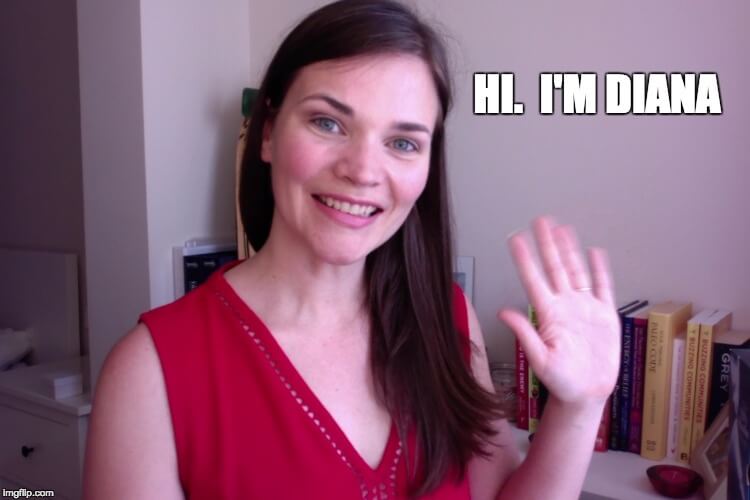
Yes. That’s right. It is I. Diana.
What?
My name means nothing to you? I'm not the Oprah of community yet?
Well shit. Ok ok. So let me introduce myself, for real then.
It all started with my parents sharing a meal in Bonanza in Moose Jaw Saskatchewan. They decided to have another baby over ribs…and that night they made like Empathy and Strategy did and…
oh…what? Too far back? Not to mention TMI!
Ok…how about 2015?
I joined Ramit Sethi's, Zero to Launch program.
Who’s Ramit? He’s a New York Times Best Selling author, CEO of a million dollar company and a man that is on a mission to stop people thinking that saving money on lattes (or more recently Avocado toast) will help you put a down payment on your house.
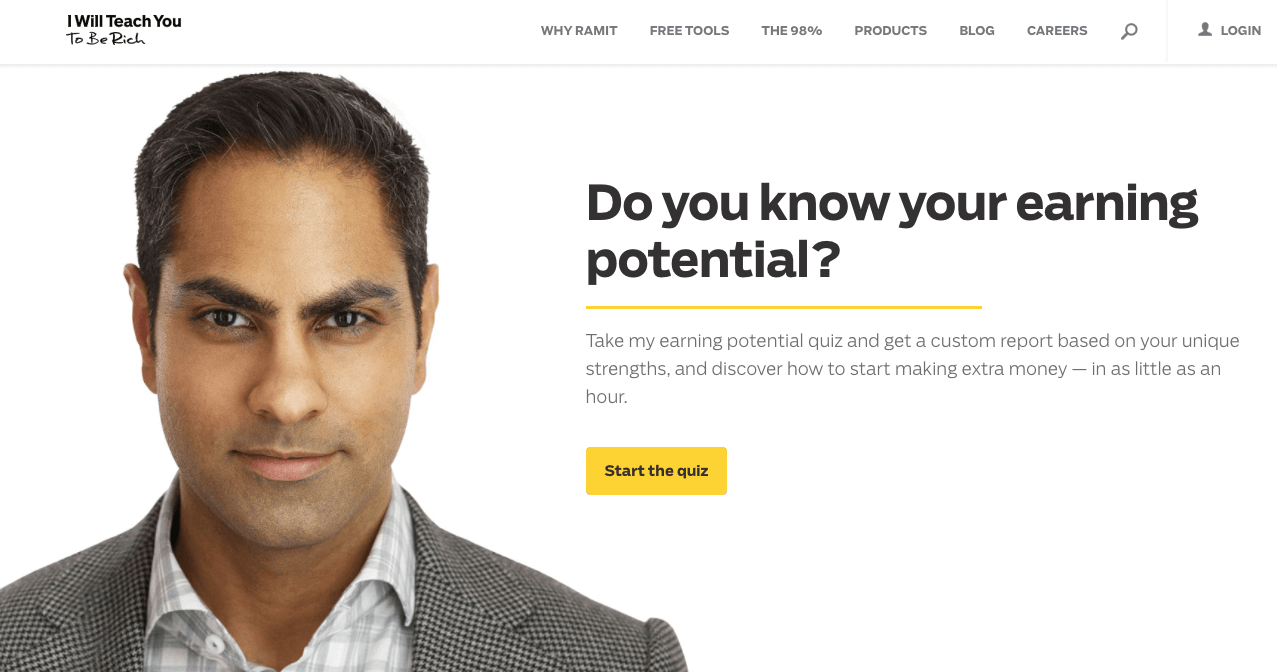
Soon after joining ZTL, I signed up for his Accelerator program (personalized coaching and an exclusive community) with the intention of starting my own online business.
I had big dreams of quitting my day job (I was an ESL teacher in Madrid at the time) and was looking to do something that I loved but could make a living doing.
It's funny how life unfolds.
The company noticed my ability to foster strong relationships and support other students in both communities and after a couple of months, they contracted me!
With IWT, I landed my first major client and I stepped into my role as the Accelerator Community Manager and Mindset coach.
It has been life-changing and I'm not just saying that to be dramatic. I am a totally different person since joining the programs and working closely with the “I Will Teach You To Be Rich (IWT) team. My marriage is better, I lost 15 pounds during one of IWT’s beta programs, I’m a better mom, daughter and sister and I’m just happier!
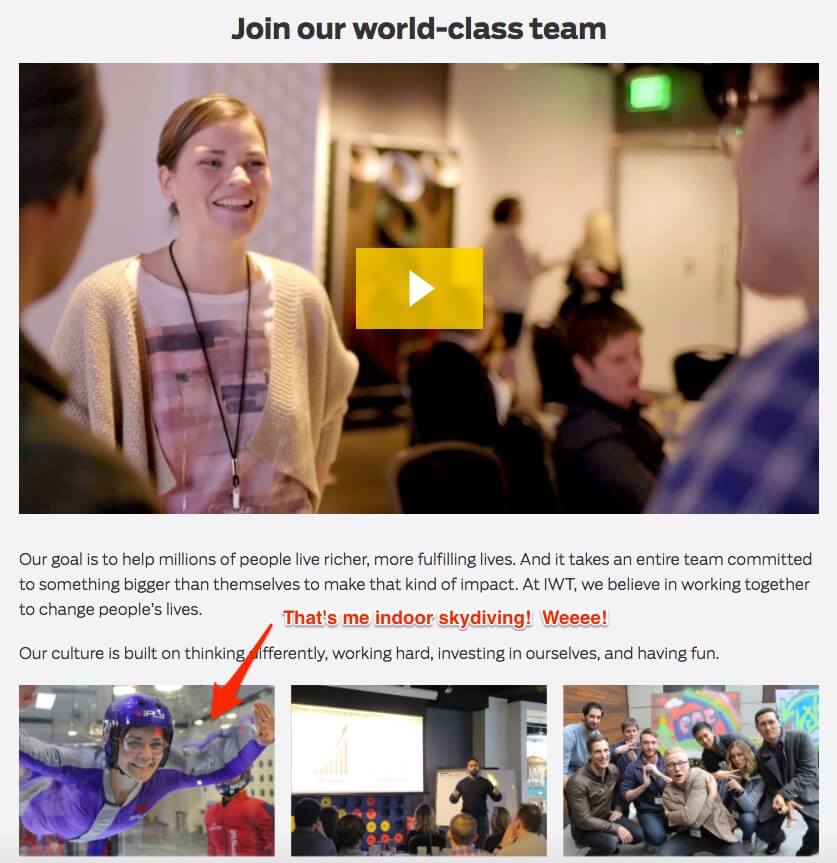
From 2015 to present, I have had the honour and privilege of not only working with some of the most ambitious, caring, and lovely students in these communities, but I also have worked with two of the most strategic, supportive and all around shiny human beings I've ever met.
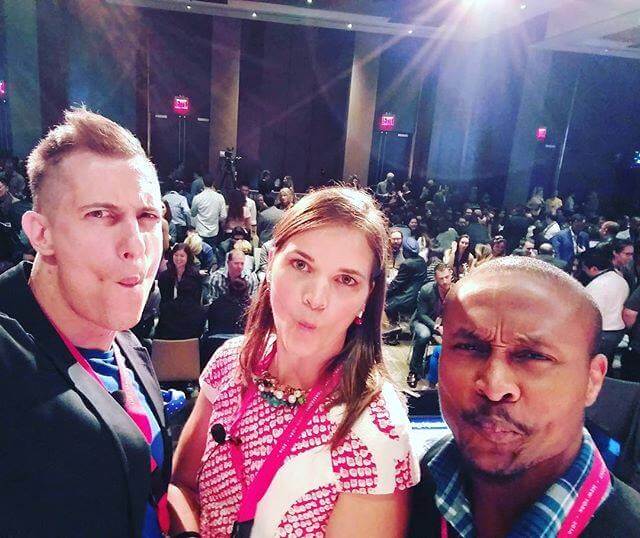
Primoz Bozic (fish face on the left).
It’s funny because when I first met him, he intimidated the shit out of me. I’m not sure if it was his approach to business strategy (very “drop the hammer”) or that his arms are bigger then his head, but he was intimidating. What I soon discovered though was that he is cares about people.
Yup…he’s a marshmallow on the inside.
I have never seen someone care so much for their students and audience. Not only did I have the pleasure of working directly with him in Accelerator for a year and a half before he set off to focus 100% on primozbozic.com, he is also the creator of “Ultimate Guide System” UGS…that's right. He showed me exactly how to make this guide exceptional and I am beyond grateful for his insights, and support. Not to mention friendship.
Marc Aarons (fish face on the right).
Holy shit where do I even start. When you first meet Marc you might be intimidated…just like Primoz. I wouldn't blame you because his accomplishments are off the charts. He is the founder of 8020solutions.co and in my world he is a wizard…of copy and well…pretty much everything.
But that aside, Marc has a way of helping you see your potential without telling you what it is. He sets the environment for growth and guides you there. I’ve seen him do it with our students and experienced it first hand and I appreciate him more than words can describe.
Not only that, he can dance a mean salsa and makes jerk chicken like a boss. I consider myself extremely lucky to call Sir Aarons my friend.
Now, when I joined IWT, I had a hell of a lot to learn and with the help of Primoz and Marc…I started face-planting like a boss.
Face planting
This is what I lovingly call making mistakes. Rather than waiting for permission or trying to get things perfect, I simply did what I thought was right or best and went from there.
Did I make mistakes?
Fuck yes…but I also developed my face-planting muscle which is actually a great superpower.
So fast forward to today and who is Diana Tower?
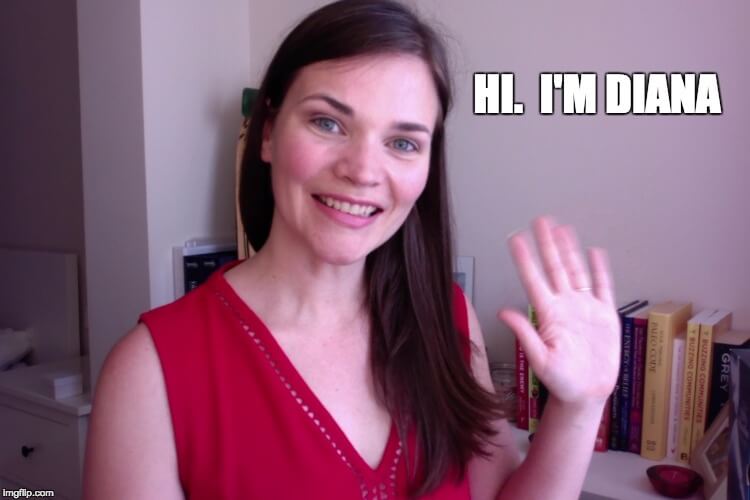
I'm an online community strategist and I marry emotional intelligence and strategy to create profitable communities that drive the profit goals of your business.
I do this for GrowthLab's Accelerator program and it's my mission to show YOU (or your community manager…if you roll like that) how to do it for your business too.
I want to take my years of experience, hours of mind numbing training (which I secretly loved) and help entrepreneurs, just like you, do three core things more easily and in less time:
- LAUNCH a community so that it works long term, or assess the foundation of your existing community. – You'll learn that in this guide.
- MANAGE your community without being a time slave to it.
- GROW your community and explore the holy grail; paid membership community – coming down the line.
Chapter 2: When should you build an online community?
Maybe you’re asking yourself that question…or some variation of it.
- How do I know if a community is the right strategy for me and my stage of business?
- How do I know when to start a group and when to postpone it?
- Am I ready for the “holy grail” aka a paid membership community?
Here is where I’m gonna drop a truth bomb about starting an online community. Some of you reading this guide should NOT create a community (yet), even though other experts might try to convince you otherwise.
I'll explain why in this guide, but for now let's dig into thosee questions… “It it the right time and stage of my business to start a community?”
This is such a complicated question and probably isn’t the question that you should really be asking yourself, but I know you are going to ask it. Like a moth to the flame…you’re going into the light!
So rather than write out everything and look at all the possibilities…how about a simple game of YES and NO?
Simply answer YES or NO to the following questions and see what happens.
Note that the same applies if you are looking to hire a community manager to do the work for you ok. Just because someone else will be doing the work does not mean that you can and should create a community whenever you get the urge to.
- Do you have over 1000 email subscribers?
- If YES, high fives. Move onto the second question.
- If NO, focus on getting to 1000 subscribers. *There is an exception in question #2.
NOTE
In Zero to Launch (ZTL) Ramit recommends guest posting. So go do that to hit your first 1k of subscribers, and stop getting distracted by a sparkly community (especially if you want to do a free open community. JUST NO – yes I just swatted your hand!)
2. Do you have a course that has more than 4 modules or is over 4 weeks long?
- If YES, and the course is over $100, create a course bonus community on Facebook or Slack (*even if you don’t have 1000 subscribers just yet).
- If NO, focus on creating your first course before you invest ANY time or energy in a community.
NOTE
I’m not talking about a Minimum Viable Product (MVP) here. You know…an ebook or a mini-bundle of videos. If you have a $50 MVP product that’s fantastic, but that’s not where you want to add a community. A bonus community is a good fit for longer, more dense courses that students can benefit from social interaction, asking questions, sharing wins etc.
3. How are your numbers? Specifically your traffic to your site, your opt-in, and your conversion rate.
- If your numbers are good, high fives. Don’t know what “good numbers” are? Check out the TIP box below!
- If you numbers leave more to be desired, focus on nailing them first before you add a community to your business strategy mix.
TIP
If you have no idea what “good” number are, then march your boo-tay over to GrowthLab to read Sarah Jones’s fantastic article “3 KPIs you should track to make sure you’re not wasting your time”.
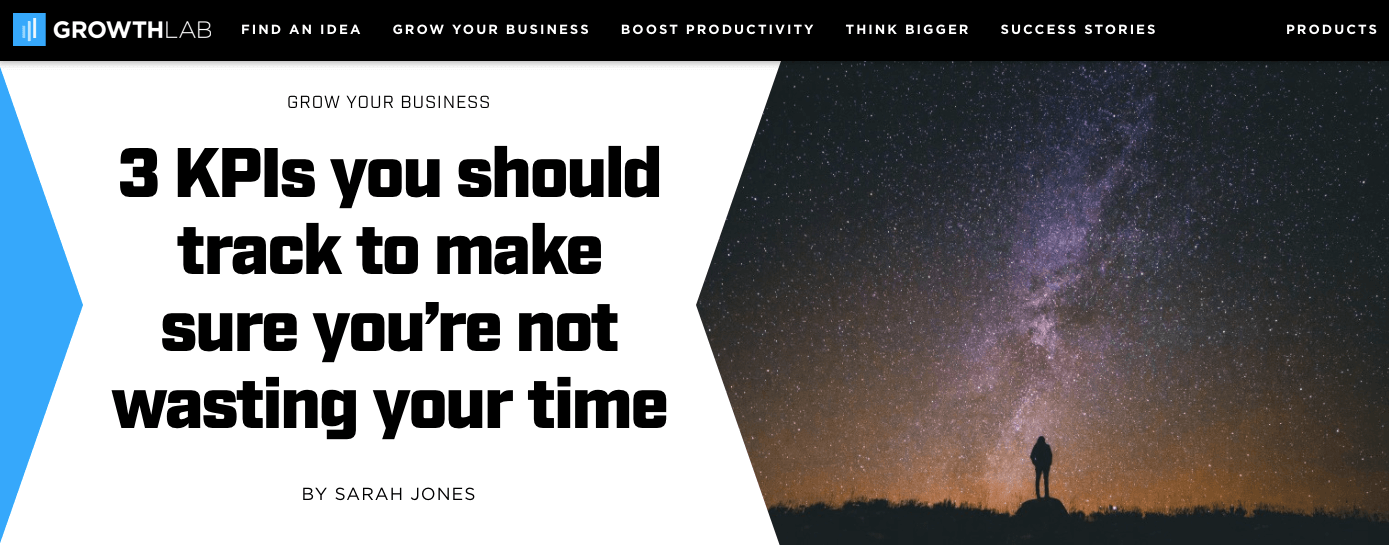
Sarah is the beautiful (inside and out) founder of Introverted Alpha, where she helps smart introverted men attract women naturally without having to be someone they're not.
In this easy to read and implement article, not only does she show you which 3 metrics or KPIs you should be measuring (and how to calculate them) she even shares a handy excel sheet to track them all.
As someone that is NOT a fan of numbers, her article really spelled it out for me without making me want to breath into a brown paper bag. Fist bump Sarah!
So what would I like you to really realise and learn right now?
Let’s highlight it:
An online community is NOT the first step of the online business ladder.
Ask yourself those 3 questions above and you’ll know if you fall in the land of YES or NO when it comes to building an online community. Now that you’ve actually looked at your specific stage of business, you can confidently KNOW if you should or should not build an online community.
How does that feel?
If you’re like me, it probably makes you feel a bit more relaxed. Now you know that either it’s not the right time AND you know what you need to change in order to get to the point of being ready or you are at the perfect stage to launch an online community.
Now that you’ve got that layer of the online community onion peeled, here’s another question that you might ask.
Do my clients even want a community?
Ok, I get it.
Your peeps are special and unique and maybe they don’t like community, support, interaction. Maybe they are all introverts that recoil at the thought of being vulnerable online with a bunch of internet “strangers”.
This is when I tell you to simply…ASK them.
If you asked those questions from before, it means that you most likely have at least 1000 people on your list AND you have a course that you are making or have made that calls for a community.
So how's about you stop worrying if they will or won’t be interested; all stuck in your head, and…
ASK THEM!
That’s right. Send an email to the people who bought your course and see what THEY think about it.
Here’s a sassy sample script to leave you with no excuses for not doing this.
Hey Hey [NAME],
I was having breakfast this morning and my grey matter was having a party.
- Should I create a community to go with my course or not?
- What would be the best for my students?
I basically was driving myself insane trying to figure out if you would like or benefit from a community to go along with my upcoming course (existing course) and rather than continue to duke it out with my left hemisphere, I thought I would do something very new age…and ASK YOU.
You are the one that would benefit (or not) from a community, so why not hear it straight from the pony’s pie hole. I’m curious.
Do you feel like having an online community would help you succeed and get results or would it just be a waste of time and energy for you and I both?
Hit reply and let me know what you think.
[YOUR NAME HERE].
Few…that’s a relief.
Write up your own version of that email (in your voice…cause well…ma’voice be all weird and shit), shoot it out to your over 1k email list and see what they say.
Now depending on your peeps they might poo-poo it OR they could flood you with emails squealing in delight and wanting to pre-order your course simply to get access to your exclusive community.
This could make you happy, but it also might peel back another layer of the online community onion and make you wonder;
Do I have the right personality to run a group?
Now if it is your sole job to manage communities, like me for example, there are going to be some requirements in terms of your personality. Things such as:
- Being empathetic.
- Being able to deal with shitty people and not come across as an asshole when all you really want to do is say “Fuck you. NRN”.
- Being organized and having systems to help you work through your processes.
- Loving what you do and caring about people
If you don’t give a shit about anyone and have zero empathy, community might not be the best strategy for your business. If that is the case, what you can do is hire some empathetic, caring bastard and pay them to do it for you. But that’s an entire Ultimate guide of it’s own.
Be the first to get your “I don’t wanna touch a community. I’d rather pay someone else to touch it for me” hands on my future resources to help you hire a community manager. Click that pretty button and tell me where to send those future guides and other goodies that go with this ultimate guide, just cause I like ya.
[x_button shape=”rounded” size=”x-large” float=”none” href=”https://www.dianatower.com/ug-landing-page/” title=”Grab a FREE copy!” target=”blank” info=”none” info_place=”top” info_trigger=”hover” lightbox_thumb=”http://www.dianatower.com/wp-content/uploads/2017/06/Screen-Shot-2017-06-22-at-10.25.03.png”]Grab your FREE copy![/x_button]
But here’s the lowdown on personality. As long as you approach your community with a strategic foundation, you can create a community that is in line with your personality.
If you aren’t a “ra-ra, you can do it” kind of person, why in gods name would you go and set up a community where you go ra-ra all over people’s accomplishments.
- YOU choose what you’ll do in your community.
- YOU choose how you’ll approach it.
- YOU choose how much time you’ll dedicate to it.
So in this situation, we’re focusing on the wrong question. It isn’t about “if you have the right personality for a community”, it’s “how to make a community that honours and is in line with your personality”.
Which you CAN do, despite what you might think.
Chapter 3: Debunking the biggest community myths that entrepreneurs have.
Alrighty then, it’s time to punch some myth-bullshit in the face. That’s right. Bullshit has a face and we’re about to mess it up old school. Get your brass knuckles peeps.
There is so much false information floating around like poo-farts that I wanted to set the record straight. Once and for all, and in one place. So brace yourself.
What the literal fuck are people thinking! Really?
Just throw strangers into a digital room and you'll magically have a group of raving fans that help you sell more without even asking them to?!
People actually think that they can pull a Kevin Costner, Field of Dreams moment and have the digital masses flock to them like zombies with their credit cards hanging out of their limp grey hands? It might have worked for Kevin in a corn field but this is real life…and online
…things be a bit different on the interwebs.
When approaching online community, people get all trigger happy. They lay in bed fantasizing about their future business, they register a domain and suddenly “I NEED A COMMUNITY”! So they slap up a Facebook Group to engage their community.
News flash dude…you have no community.
No one cares about you. For fucks sake, get over yourself. You’re just another XYZ business.
*** Real Life Moment ***
I am currently a member of almost 100 Facebook groups.
Damn that is a lot. I must be one hell of a busy woman. Um, not so much. I would say that I am active or enjoy about 5 of those groups. I’m not alone. Many people are members of groups or communities that they end up disengaging from and it’s your job to make your community stand out.
A lot of people think that a community will automatically get them raving fans and position them as an expert, but that’s not how it really works.
Notice something about the myth though, you want to use your community to sell more, but most people creating communities… wait for it…wait for it…
They have nothing to sell yet!
They don’t even have a course. They are growing their email list, creating exceptional content and establishing themselves, and suddenly they get this bright idea that a Facebook Group could help them grow faster.
Now, before you throw your arms up in the air and hate on me, hear me out.
This may rub people wrong, but I’m still going to say it. Your first community should NEVER be a free community. Period. If you only walk away learning one thing from this guide, make it that.
This is the litmus test to see if you should create a community or not. Ask yourself, do I have a paid offering yet that needs a bonus community? If you do…hit the gas and let’s ride.
If not. Slam the breaks and make that other shit happen.
They can, but I would use other tactics to accomplish this initially.
That’s right. An online community is fantastic but it isn’t a magic bullet.
There are other ways to establish yourself (ways that Selena Soo outlines in Impacting Millions for instance) that have a much better ROI.
So if you are looking to establish yourself as an expert. Don’t start with a free community.
So many people want to be seen as an expert and they will go to great lengths to make that happen. Some people think that the simple act of having an online community will accomplish this.
EEeeee!!! Wrong.
If you want to use a community to establish yourself as an expert, you’ll need to create an open group and the issue with open groups is that you shouldn’t start with one.
You should start with a closed group for one of your products or services. That is where you can nurture relationships with your paying clients (the right people to foster relationships with BTW) and figure out what they need and want from you.
There are lots of ways to establish yourself as an expert, and you’ll need a combination of them in order to really establish yourself as an expert in your niche.
Truth Bomb: Creating an online community in and of itself does not make you an expert, BUT giving your clients a place to connect and support one another and flex your helping muscle is a great way to go above and beyond with your online courses and create raving fans for life.
Picture it. You decide to set up that free community to bring your credit card zombies together to “engage” and celebrate by buying your shit — naturally.
But what you don’t realize is that when you kick things off with this kind of community, you are begging the universe to fuck with your emotions. Either you’ll have a runaway train on your hands that is out of control and has you chained to your desk or you’ll be the proud owner of a ghost town. Digital tumbleweeds be rolling past you dude.
So if you don’t want to be Facebook’s (Slack’s or whatever community platform’s) bitch, side step all the other wantrepreneurs and do community strategically.
When you build a community, I want you to guarantee that it’s a success. That the majority of your members transform into raving fans that promote you without being asked, and who share opportunities with you just because they thought of you.
There are NO guarantees of this happening when you create a free group and “launch it”, but what happens when you create a course and include a bonus community?
Primoz Bozic did just that with his new program Ultimate Guide System. I’ll be showing what he did with his bonus community on Slack in chapter 9.
Just know this…if you don’t have a community, pop your community cherry by making a bonus community for one of your courses.
This is so wrong it hurt to even type that headline. Breath Diana! Breath!
If your course is $50 and solves a small pain. Ok fine, you don’t need a community. Carry on.
But when should your course include a free bonus community? Ask yourself the following Qs.
- Is your course over $200?
- Does your course help solve a difficult or stressful issue?
- Does your course have 4 or more modules?
- Does your gut say yes?
If you answered yes to all four, then a community is going to be a huge win for you.
When people join a course, especially when it is over several weeks, they aren’t just paying for information…what they really need is support, accountability, and a sense of community to get the most from the course. To keep them coming back for more and digesting the material.
You do NOT need to do 50 different things, be in the community 10 hours a day or drop everything to provide this, but facilitating a safe space for students to ask questions, share wins and connect with others is so incredibly important.
It’s an investment in your business that will pay huge dividends down the line.
This is just cray-cray! Why would anyone give up total control over their business and put it all in someone else’s hands?
Hey rich dude wearing a hoodie, I’m going to build my biz on your property, so it’s your’s but mine too. Cool?
Really?
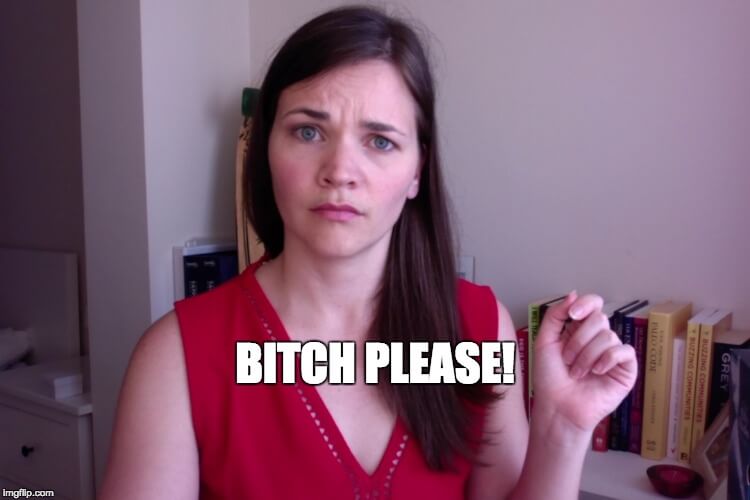
That just doesn’t make any sense. Some people don’t even like the idea of hosting their communities on Facebook, let alone their entire business. The risk is simply too high.
- What if Facebook changes their rules?
- What if there is a major change that hinders your business?
- What if Mark Z decides to eliminate groups all together?
You’d be screwed dude.
So NO. Don’t replace your website with Facebook glitter.
Ok so here is the big secret that pretty much everyone is getting wrong when it comes to building an online community. Everyone is focusing on tactics.
- When should I post?
- How many times a day?
- Should I do Facebook lives?
- What kind of content should I be sharing?
So many questions, which gets pretty overwhelming, but no one is stopping to ask themselves:
“Hey self, are these actually the right questions to be asking right now? Am I focusing on the right thing or should I be looking at something else?”
Here is the truth:
Tactics are NOT where you start.
Please don't go look at what everyone else is doing in their communities and start spinning it for your audience. 9 times out of ten, it will flop on it's face.
Why? Because those tactics are driving a strategy that was made for them (or at least that should be the case).
Tactics are not universal and so we can't expect “daily threads” to suddenly transform our groups into thriving, real and engaged groups on the internet.
If that were the case, then everyone would simply be doing exactly the same thing and everyone would be running communities that contribute to them making money.
Ok, in a world where many of us worry about what other people think of us, why in God's name would you want your family and friends joining your community? Especially if they aren't your target audience.
If you're doing your job right, they will hate your community and not see the point, because it will repel them…as they aren't who you are targeting.
By having them there, you're inviting comments, observations and “helpful advice” that really isn't helpful at all, especially if you have issues with wanting your parents to be proud of you.
Don't make things more complicated than they have to be. Don't pad out your group with friends and family. Own the fact that your community is small and spin it so it's a positive.
Ok, so this is a partial myth. A lot of people don't know when to start a Facebook group (or any online community) and this uncertainty stops them from ever doing it. Also, people also seem to assume that they need to start a free or Open Facebook group but that isn’t true.
So here's the deal.
First up…you don't need a free Facebook Group when you are starting out.
Focus on doing what is really important; customer research, setting up your website to catch subscribers, offering an opt-in and ensuring your opt-in rate is good, guest posting to grow your list and gain credibility markers etc. You can do ALL of that without a community.
Second up…remember that your first ever community should be a free bonus community for your paid course.
Start there, gather your zombie fans and then use them to seed your bigger community that is open to anyone down the line (if you even decide to have an open community). Doing this eliminates most of the issues that we stress about. So do yourself a favour and keep it simple.
Now as for this myth, I would be more specific. I wouldn't invest ANY time into creating a free/open community until I had a solid email list for my business. That email list is your community, just in a different format, so by focusing on growing your email list, you are planting the seeds for your online community.
Again, this depends on what stage you are at. If you are starting out, have 500 people on your list, and have one paid course, an online community isn't the best ROI for your business just yet.
The only thing I would recommend is providing a free bonus community to that course (if you haven't already) and save any other community efforts for later. That way you can grow your list, improve your product and start to connect with your paying clients via the bonus community.
Now, if you are trigger shy on the course bonus community, remember that YOU set the pace. If you want to be in the community 5 hours a day…you can set the bar there.
If you prefer to be in your community a couple hours a week…you set the expectation. So as long as you decide your involvement before you start the community, you'll be in control and it won't pull you in different directions.
Ok seriously? Nothing is forever.
Some dude on Reddit recalled his math professor Mike's insightful words:

“There are only four things that last forever: True Love, herpes, glitter, and an F on your transcript.”
You might be stuck with glitter or herpes until the end of time, but an online community? You can toss it in a potato sack with a big rock, tie it up and toss it in the river whenever you deem necessary.
That's right…your community could end up being an unwanted kitten, and you can dispose of it.
Or you could give it to a friend or the SPCA you heartless bastard! Ok…metaphor just got me all emotional.
What I'm trying to say is that creating an online community might seem like a “til death do us part” commitment but it really isn't. Again, you are in the driver's seat and you can choose when to hit the brakes or pull over on the shoulder.
That's exactly what Leonie Dawson the founder of www.leoniedawson.com decided to do with her free Facebook community.
With over 20k members, she knows a thing about online communities.
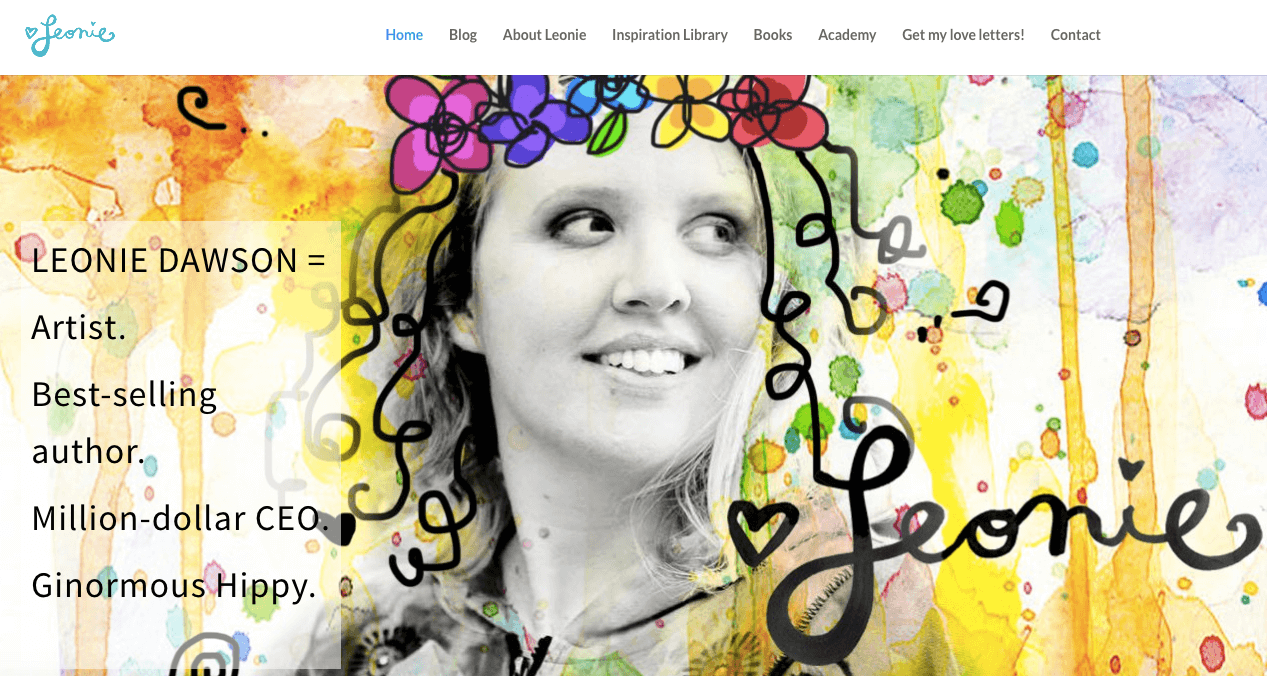
Leonie recently archived her free group taking what she calls a “social media sabbatical” but she is still staying active in her paid community “Academy”.
To make you feel super mellow, you can even close down a paid membership group *gasp*!
I know. Why in God’s name would anyone want to close down their holy grail money maker?
Well, Ramit Sethi did just that.
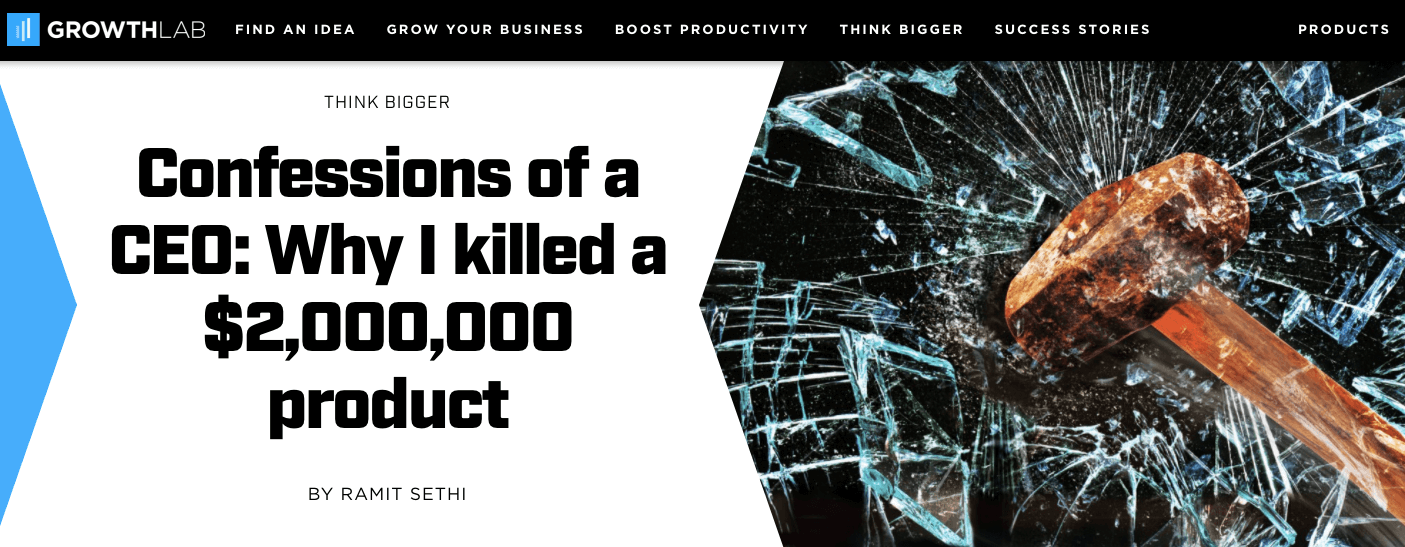
He closed down his $2M membership product Ramit’s Brain Trust (RBT) in December of 2016, and although this was extremely difficult he and his team knew that it was the right decision.
“For the first time ever, our churn — the number of customers leaving the product — was greater than our growth.” To read about what went behind this decision to pull the plug, check out his surprisingly vulnerable post , “Confessions of a CEO: Why I killed a $2,000,000 product”.
So moral of the story, don't believe your coconut when it's whispering that “creating a community is going to be a life long ball and chain that will forever be attached to your business”.
You can “kill” it at any time and it won't end your career.
Chapter 4: What kind of online communities are there?
I know that you might be asking yourself, “Is now the right moment to start an online community? Will an online community actually make a big different”
If you are, then you’re not alone, but you’re also jumping ahead of yourself. There is actually ONE question that you need to answer FIRST before you even think about starting an online community.
What kind of online community should I start?
That’s right. “Online community” is like saying I want to host an event. Well…what kind of event dude? A wedding? A book signing? A slumber party? Blind date? These are all events but they are completely different, just like online communities.
So do yourself a favour and let’s narrow down what we mean by online community.
A community for students who buy a paid online course
What it is?
A paid course bonus community is a community that is available ONLY for paying clients of a particular course or service you offer. These communities are generally offered via a closed Facebook Group or a private Slack community.
Here are some examples of my favourite course bonus communities and why I like them.
IMPACTING MILLIONS – SELENA SOO
Impacting Millions Insiders Circle is a yearly group that comes with the course Impacting Millions. It is like a sandbox for students to play with their media and publicity assets.
Talk about useful!
What do I love about this community?
That their guidelines are SUPER clear and enforced.
I remember when I joined and there was an “introduce yourself” thread and several people started introducing themselves on the Facebook wall instead. It was frustrating (coming from someone that follows guidelines) but within 30 minutes ALL of those posts were gone and those people were re-posting on the thread. It is refreshing to see Selena and her team setting and enforcing guidelines.
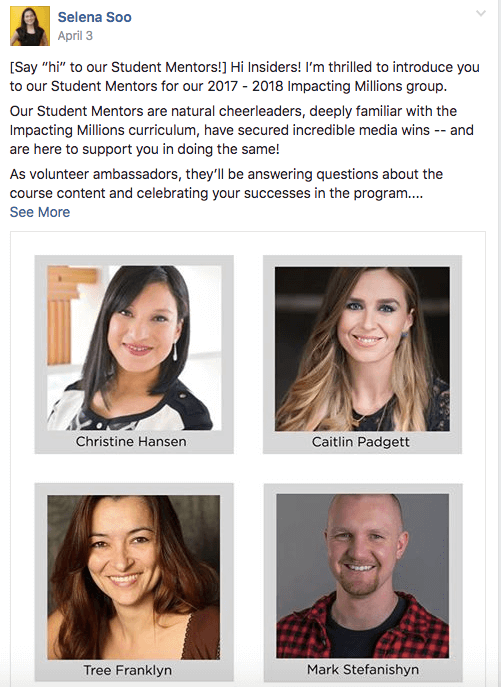
The host of the community is hella active.
Sometimes community hosts won’t be super active, which is fine (when this is established from the get go) but I was pleasantly surprised to see Selena all over the community. She dedicates time to answering questions and giving support to her members. It’s a real white glove approach to community.
They have student mentors.
It isn’t realistic to expect Selena to be in her community 24/7 and answering everyone’s questions and so she faced this reality by bringing in some of her star students to help out.
It not only helps everyone in the community get high quality insights and feedback, it highlights some of her most successful students. We call that a win-win!
ULTIMATE GUIDE SYSTEM (UGS) – PRIMOZ BOZIC

Primoz, the founder of www.primozbozic.com opted to go with a Slack community, which I originally thought was a mistake but I was wrong (yup…I’m human!).
In UGS Primoz takes students (including myself) by the hand and helps us create our first Ultimate Guides (this beast you are reading right now).
He has broken everything down into micro-steps and each week we hop on a 1.5 hour call to learn our next steps. After the call we can take things into Slack to ask questions, get advice and connect with other students.
Individual channels for each module
Something I love about Slack for live group coaching programs, is that you can create channels for each module or task. A channel is like a digital room that you can focus on one topic in. This is much easier to manage than Facebook scroll-fests. Posts are easier to find in Slack and it really sets you up to focus on taking action.
Primoz is super accessible
Just like Selena, he is in his community. It feels like he is ALWAYS there, ready to kick you in the ass or give you some encouragement. Obviously he has set his availability quite high, but that is strategic in the sense that this is his first launch of UGS and his students’ success is his success. By answering our questions, he can see where there are holes in his course and he can make future versions even better.
ZERO TO LAUNCH (ZTL) – RAMIT SETHI

I will always have a soft spot for the Zero to launch community as it was the first online course that I had invested in, and it literally changed my life. I love how it isn’t a pitch fest and that it’s a place to ask questions and help other entrepreneurs.
Strict guidelines that are enforced.
Ramit Sethi sets the bar high and has strict posting guidelines which allow the community to stay high level. There aren’t the usual superficial or distracting posts in this Facebook community. Some members might feel a bit intimidated by this approach but it works.
Ramit is active in the Community.
Do you notice a pattern? Communities that have active hosts make members feel special. Like they are making time to help our their members and clients. They care and want the best for their students.
Posting Template
It isn’t enough to just say what you can and can’t do, Ramit actually provides a specific template for how to post in the community, which includes a specific title, context, what you think you should do etc.
GET STYLE CONFIDENCE – HILDE FOSSEN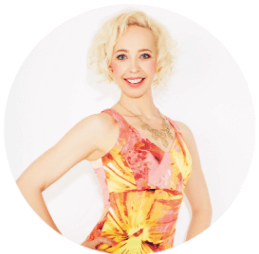
I adore this tight knit group of stylish women. Hilde opted to create a Facebook group for her Get Style Confidence program, and it is the perfect match for her audience and course.
A place to practice
This community brought the content of the style course to life. Learning how to dress better was easy with Hilde’s course videos and content, but the fun really began when we took things to her FB group and shared photos of ourselves in our bathroom mirrors.
It was like going shopping with a group of your best girlfriends. Best of all…they all had the same knowledge as you and Hilde so they wouldn’t bull shit you saying, “oh yes…those pants look…um…nice”.
Organized
In the community we each had our own threads, so we could come back and post more photos and share (without overwhelming the community).
A Free/Open Facebook Community
What is it?
This is a community that has no restrictions on joining. You don’t need to buy a product or pay a subscription to be a member. These are typically open Facebook groups.
This is the group that people fantasize about a bit. They’ve been told that these groups can create free leads and be used to promote their courses and services. But what most don’t tell you is that they are a bitch to grow and manage when you are just starting off.
SO DON’T. Just don’t.
Here is my favourite example of a open group though, just incase you want to drool a little..
60 SECOND PERSUASION – BUSHRA AZHAR

Run by the Queen B of persuasion herself, Bushra Azhar has created a massive following in this open community.
Expectations are set from the get go
She makes it VERY clear what you can and can’t do in her corner of the internet. Her community description leaves nothing to question.
Oozing Personality
I appreciate that this group has personality. Bushra is the Ellen of online business and she makes it feel like she’s a close friend, in addition to one hell of a persuasionist.
Paid Membership/Subscription Community
A paid membership community is exactly that. Peeps give you money on a monthly basis to get access to something.
Note: You can’t charge money for access to a Facebook Community (that is against FB’s terms of use) BUT you can offer a Facebook community as a bonus to something else.
A great example of this is Bushra Azhar’s PH Lab. She provides video workshops and trainings in a members area and she has a bonus FB community for those members. She charges $27 a month and people eat up her trainings like Nutella…with a spoon…with you head in a kitchen cabinet.
Oh the guilty pleasure!
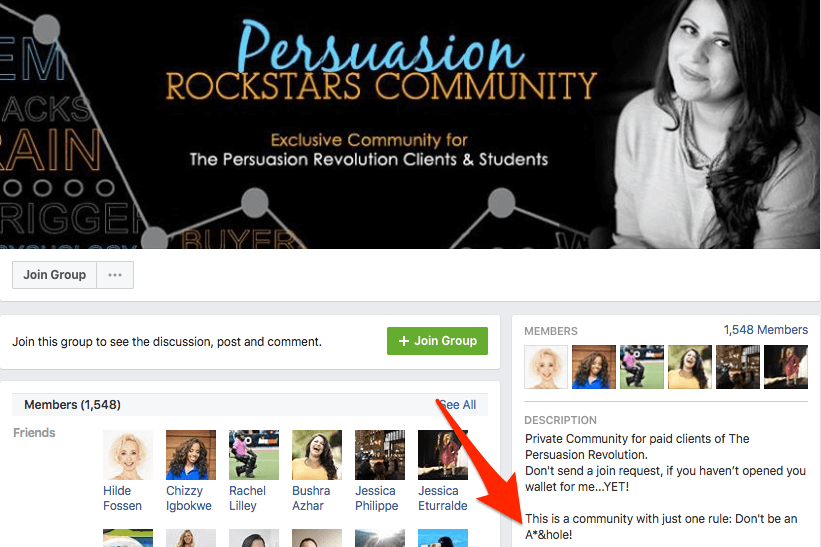
What is that big red arrow pointing to? “This is a community with just one rule. Don’t be an As*hole”.
Another example is Accelerator, which is my baby.
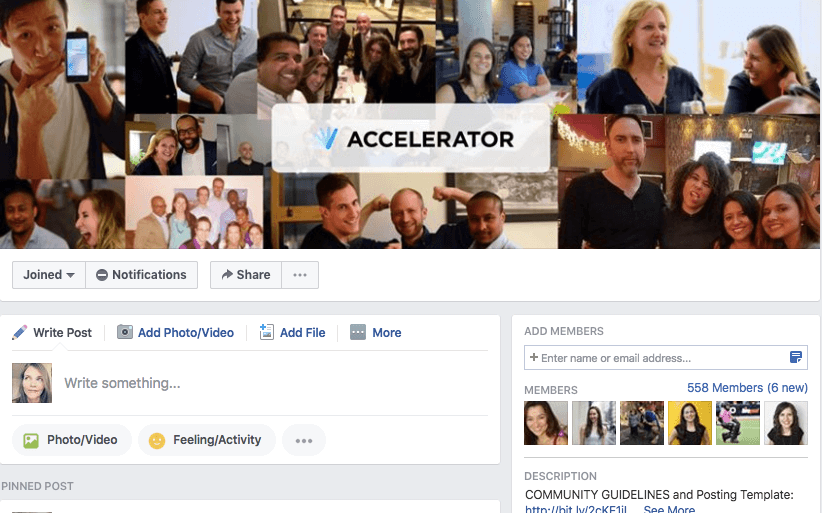
I’ve been the Community Manager for Accelerator since the Fall of 2015 and Accelerator gives entrepreneurs access to world class business coaches on numerous live calls throughout the week and access to the bonus Facebook community.
So when should you consider creating a paid membership community?
We’ll get into that in a future guide, but just to be clear, this isn’t the first type of group you should be making. Get your footing with a course bonus community first. A’ight?
Chapter 5: What platform should I host my online community on?
I get you.
You’re a professional and you want to do things right and if you DO create an online community, you want to DO it like a boss.
Maybe you think that means using a fancy paid platform or having some digital ninja design you one from scratch for a pretty penny.
Stop. Just stop.
Why in God’s name would you want to sink thousands of dollars in a community if you’re starting from scratch?
Rather than try to be a baller and pimp your community ride, how about trying something different?
How’s about simply creating a safe space for your peeps to come together, ask questions, share wins and get help with their issues? Think about them and their experience and you’ll nail it…no matter where you set-up shop.
There are two platforms I am going to discuss with you in this guide; Facebook Groups and Slack groups. I want to make sure we are on the same page when I refer to each group so let’s do that here.
Let’s dig in.
Why multi-million dollar companies choose to use Facebook
According to Zephoria Digital Marketing,
“worldwide, there are over 1.94 billion monthly active Facebook users for March 2017 (Facebook MAUs) which is an 18 percent increase year over year. (Source: Facebook 5/3/17) What this means for you: In case you had any lingering doubts, statistically, Facebook is too big to ignore.”
So basically…a shit tonne of people are using Facebook and most likely your customers and future customers are already on Facebook.
What this means is there is less of a learning curve for when they join your community.
Let’s do a lightning round on some common questions because well…I know you might be wondering but you might not want to ask. OR you might not even realize there is a difference.
So here we go.
There is a lot of misconceptions when it comes to Facebook so I’m going to take this opportunity to give everyone a little FB101 for how things are right now.
The difference between a Facebook Page and Group, so we can all be on the same page.
Ok dude, it’s time to ensure you don’t end up like this person,
“I wish I had done more research before I started my page. I actually should have made it a group. I didn’t know there was a difference.”
FACK! If people actually knew what pages vs groups were BEFORE the set them up, this shit wouldn’t happen. So, before you say I DO to a page or a group, go on a few dates and make sure you like the guy or gal before you invest any time or energy into them.
What’s a Facebook Page?
This is basically like a personal profile but for your business. It isn’t for you as a person, but sort of like an avert or newspaper listing for your business. As some of us are our brands though, we can set up a page as a public figure.
Facebook pages are NOT places to connect with your audiences, it is more of a one way conversation. You standing on a Facebook soapbox with your megaphone talking about your business. Look at meeee!
What’s a Facebook Group?
This is more like your online living room where you invite friends to come and interact with you and one another. It’s a space on the interwebs where your audience can come in, make themselves at home and chill out with like minded people, or others who are struggling with the same issues or problems.
For the purposes of this guide though, we are going a step further and talking about Facebook Groups as communities for paid courses.
NOTE
You can not charge money for membership to a Facebook group. This is against their guidelines. BUT you can offer a Facebook group as a free bonus to your courses to get around this.
Shit…that wasn’t very LIGHTENING ROUND was it. Ok Diana…chop chop.
Pros and cons of open, closed and secret FB groups
Let’s keep things simple and use a funky-licious table and look at an example. Let’s say I want to create a bonus community for my paid program, “Raccoons on Crack”. Don’t ask.
Take a look at the table on the following page, which I grabbed from Facebook.
Oh ya…it’s so funky-licious…aka just a normal table.
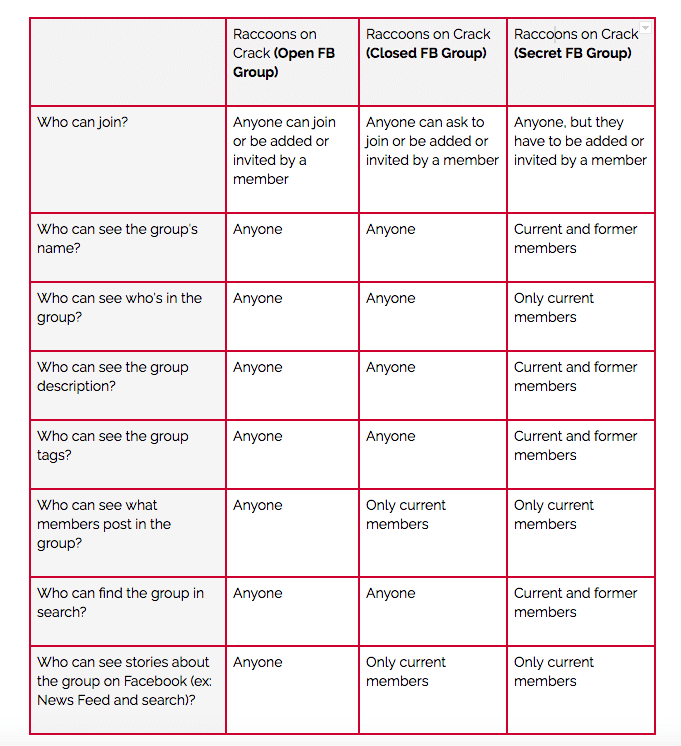
So for the purposes of making a community as a bonus for a course, I recommend using a closed group. Why?
Benefits of making a group closed vs secret.
Basically a closed and secret FB group are private communities that other people can’t see the posts/content shared within them (perfect for when you want a community for your course). The only main difference is that anyone can search and find a closed group, where as a secret group is not searchable.
So here’s the deal. If you have a group as a bonus for your course, you don’t need to make it a secret, in fact having people be able to find it but NOT be able to get in can create curiosity and a bit of FOMO.
Nothing like a bit of FOMO to promote your program. 🙂
#1 thing that makes Facebook better than all other community platforms
The biggest benefit of Facebook, by far, is the fact that over a billion people are already using it. You won’t need to try and get your members to adopt a different platform and log into it to interact in your community.
Getting people to do that behaviour consistently can be a huge hurdle. But Facebook…it’s already there, it’s on their phones and computers and it’s sticky as fuck.
Notifications, and newsfeeds and lots of bells and whistles that encourage users to be in Facebook and keep on coming back. It keeps your community top of mind, which is extremely difficult these days.
Is it really necessary for me to have a business page on Facebook as well?
As I mentioned before, these are two completely different animals. One (the page) is like a profile for your business, where as the group is a community…a place to connect and interact with members.
So my advice, would be to have both but here is the thing…
Use your Facebook Page like a newspaper ad.
Put it up, link it up and esencially it can be a place for people to land, learn a bit more about you and jump to your website.
THAT is where you want to drive people anyway. Your goal should be to get people to your site and to sign up for your email list.
One situation when I would NOT use Facebook
If you are creating an online program, where you are going to provide live coaching or support to your students via the community. I wouldn’t use Facebook, I’d use Slack.
Doo doo doo dooo! Introducing Slack.
What is Slack?
It’s like an instant messenger and a forum went and had a crazy one night stand, and then 9 months later…baby Slack was born.
(Apparently this is my favourite metaphor of all time. One night stands for all!)
The way that Slack is set up is super intuitive, easy to use, you always get messages to the person you want to (in Facebook you need to be friends to ensure that messages get to their inbox), and you can create channels to divide up your course.
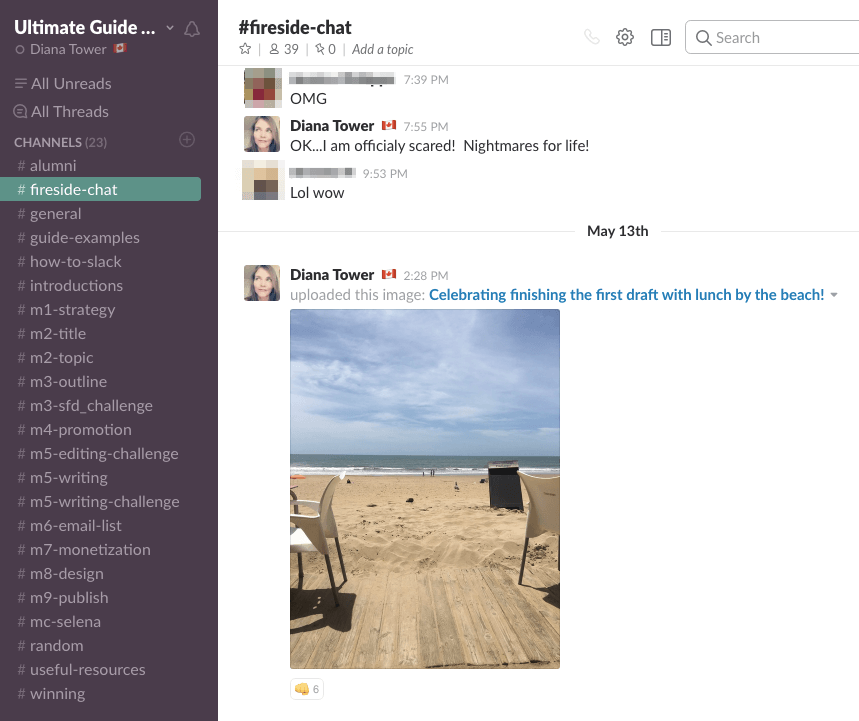
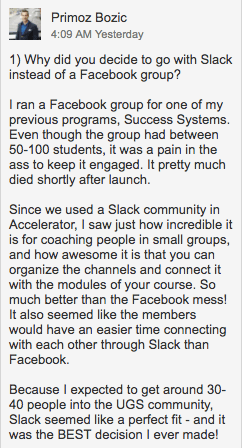
Primoz Bozic went with Slack when he launched his Ultimate Guide System (see screenshot above), and for a minute there I thought it was a mistake, and I let him know.
Boy was I wrong.
Being good friends with Primoz, I reached out and asked him a couple questions about using Slack to create this community so I could share them with you..
My first question: why did you decide to go with Slack instead of a Facebook Group? You can see his response in the screenshot to the right.
What I absolutly love is that he made the decision to go with Slack knowing what it was like to run a Facebook group for a previous program, Success Systems.
Like I suggested earlier, if you are going to be coaching students through a program, I would highly recommend Slack.
“I saw how incredible [Slack} is for coaching people in small groups, and how awesome it is that you can organize the channels and connect it with the modules of your course. So much better than the Facebook mess” – Primoz Bozic
My second question, what's the number 1 thing you like about Slack? I love his response.
“JUST ONE?!?!?!?
Can I do three? Or maybe five?
#1 – I LOVE that I can connect the specific channels to the modules in my course. One channel for coming up with a topic for your Ultimate Guide. One for the title. One for the table of contents. And so on. This helps keep the channels super focused on similar questions and the community super organized. It also allows me to track how the students are doing in the program.
#2 – I love the “threads” feature which is similar to Facebook posts. This way we can still have longer conversations with students without spamming the channels.
#3 – I love that I can privately message my students without my messages getting lost.
#4 – It’s not on Facebook, which is awesome, because I don’t get sucked into all the different notifications. I can just stay focused on getting in and out of the community, answering all of the questions and not wasting time while doing it. On that note, the notifications in Slack are so much better than in FB, as I can see exactly where people need my help.
#5 – Coaching, asking follow up questions etc. is just SO much easier and faster than the “back and forth” with Facebook. I feel like Slack is the perfect platform to run a coaching community on.”
– Primoz Bozic
I didn’t stop with Primoz though. I reached out to some of the members of his community and asked them similar questions and the response was pretty unanimous.

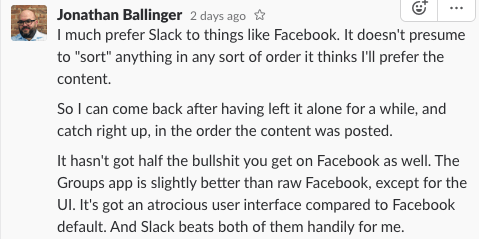
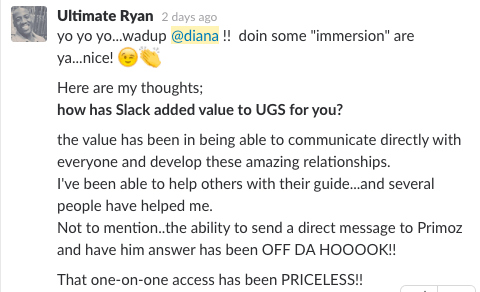
As you can see, students and members of the community love how organized Slack is, and how it allows them to gain direct access to their host and fellow students; without distractions.
The one app you need to use and introduce to your Facebook Group members.
If you went with Facebook and you are one of the people that just ain't digging it and kind of want to throw garlic and wooden stakes at it.
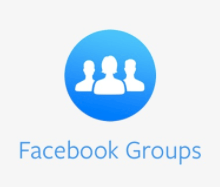 I’m going to introduce you to an app that is gonna make life easier for your members. At least on their phones.
I’m going to introduce you to an app that is gonna make life easier for your members. At least on their phones.
If you’ve been wondering how to quiet the noise of FB so that your members can get support and get shit done….introducing “Facebook Groups” app.
- Step 1: Go to the Apple store, Google Play store or whatever store goes with your device and search for “Facebook Groups”. It will show up with a blue circle and 3 white silhouettes of people.
- Step 2: Download that free shit and do a little dance with excitement.
- Step 3: Log into your Facebook account.
- Step 4: Drop your jaw as all you see are your groups. That’s right. All the noise, all the fuss…all the bells and whistles and distractions? GONE-ZO!
Fun fact, when you are in your groups, there are NO ADS! There’s nothing on the right to distract your…simply your group content.
Boom-digity. Ya-welcome!
Chapter 6: The key to building a profitable community that protects your time and sanity.
Alrighty folks…lean in and listen good.
THIS is the chapter that everyone should be reading and paying attention to. Now don’t get me wrong. Everything that we have covered so far is important too, and I know those questions have been bumping around in your coconut so I wanted to address them and tell them to back off of your grey matter.
That’s right. Back off!
Now that things are a bit clearer…we need to get real…and get strategic.
That’s right. We aren’t going to focus on what you THINK you need to know, we are going to focus on what you actually need to do to create a community that puts green back in your pretty pocket.
Before you click “create group” ask yourself this ONE question.
I am not exaggerating when I say that THIS question will make or break your community.
Fun Fact: The success of your group and your sanity is decided before you even create the group.
Before I share the million dollar question, let’s explore what people (and maybe you as well) THINK community is all about. So many entrepreneurs tell me that they want to create a safe space for their audience to “engage” with each other.
That sounds nice doesn't it. Engaging, interacting and doing shit.
Um…*timeout for a sec*.
- What the fuck does “engage” even mean?
- What do you want your peeps to be doing?
- How does that “engagement” help you make money?
- And more importantly, how the fuck do you get people to DO what you want them to do in the first place?
Here’s the thing, building a group to “engage” your audience or make them feel supported sounds nice, but it isn’t enough and will leave you with crickets or even worse, you spending hours slaving away in your community for little ROI.
I don’t want that for you. So let’s cut it off at the pass.
That million dollar questions I mentioned…remember that?
Well here it is…
What emotion do I want my members to feel?
Let’s break this down because there is more to this than meets the eye.
#1: What is your goal for your community?
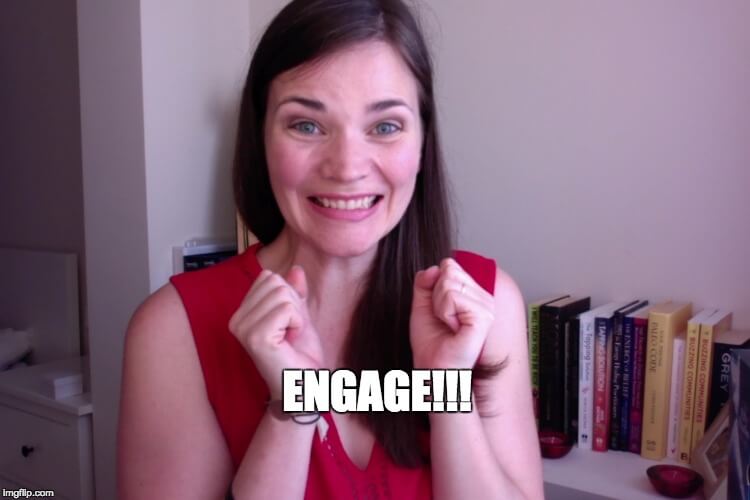
If you said engage…EEEEEEEGGGGGG. BUZZER! NO.
Fuck NO. Wrong answer (even though I’m pretty sure almost everyone said that, so don’t feel bad if you were one of them).
The key goal needs to be tied to MONEY. Yup. Get in touch with your wolf of wallstreet side and think about moolah.
What goal do you have for your community that is directly related to ROI?
- Driving retention for a paid membership community.
- Creating repeat customers and selling more programs.
- Reducing customer service tickets by answering questions in the community.
#2: What behaviours (from your members) will drive those goals?
- Maybe it’s getting new students to introduce themselves or ask their first question.
- Maybe it's getting vet students to share their wins and insights with the community.
#3: What emotions do students feel in relation to doing or not doing those behaviours?
- This could be anything! Pride, connection, support, etc. Don’t accept “feel happy”. Dig deeper and really pinpoint the emotion that they want to feel (or avoid feeling).
#4: What can YOU do to trigger those emotions. Either intensify an emotion to encourage something or lessen an emotion to stop discouraging an emotion.
- Trigger pride while lessening embarrassment.
Answering those 4 questions gives you a very high level strategic plan for your community.
If you learn and act on those 4 questions, you’ll be light years ahead of most entrepreneurs that slap together a community for their online course and hope for the best.
If you really want to go to town on this, you could learn more about managing a community from a strategic perspective in Richard Millington's outstanding course, Strategic Community Management. It's the 6-week certification program from Feverbee (his company) that I took this past year and it completely transformed my perspective on how to manage a community.
It's geared towards community managers though, and as a busy entrepreneurs running the show, it might not be the best use of your time; BUT if you decide to hire a community manager…make sure they have this certification under their belt. 😉
How much time should I spend on my community?
What’s that? Asking the wrong question again?
Yup, that’s what happens when we don’t have a strategy or plan for creating or building something. We start to think about all the “What ifs” and wonder if we are doing everything right.
So let’s regroup and start asking the right questions.
Question #1: What resources do you have to dedicate to your community?
This seems like such a simple question but NO ONE asks themselves this before they dive in. We focus on the platform, or what daily posts we’re going to use but what about your most valuable resource? TIME.
This is when you sit down and ask yourself, honestly, how much time per week
- …do I actually have to dedicate to this?
- …do I want to dedicate to this?
- …would make me feel good about it?
- …would make me resent it?
Knowing the answers to those questions is going to give you a clear indication of how much time you are going to allow yourself to invest in your community. You’ll know upfront if you’ll be spending an hour a week or 5 hours a week. It is in your hands and depends on the time you have available and are willing to invest in it.
NOTE
We aren’t discussing cost of the platform as I’m assuming that you’ll be looking to build a community either as a Facebook Group or a Slack community. There are many community platforms that you can pay for, but for the purposes of this guide we are focusing on Facebook groups and Slack.
Bottom line?
Don't wait to see how much time your community will take you…show it who's boss from the get-go.
So now that you know how much time you have and will dedicate to your community, let’s move on..
How much time is actually needed?
Without creating a full community strategy (which I highly recommend for paid course groups and paid membership communities) you’re going to be wondering what you should be doing.
What actions should you be taking on a weekly/daily basis to ensure that your community takes off and supports your members as they progress through your online course?
You might be thinking specific tactics that you’ve seen in other groups like:
- Sending private messages to welcome, check in and engage members.
- Writing “engaging” posts in the community.
- Creating challenges.
- Creating quote art or memes.
- Doing FB lives.
- Creating automated posts and writing content all in advance.
What I am going to assume right now is that you have little to NO time and you want to basically know the ONE thing you need to be doing in your community.
Well folks…the one thing you need to do is to trigger the ONE emotion that your audience wants to feel in your community. That’s it (at least that is the first thing you should worry about…and you can expand your strategy from there).
I could get all complicated and show you graphs and flow charts of how this all fits into the bigger community strategy picture but you don’t need to know all that shit.
All you need to do is simply ask your members how they want to feel in your community, and see what emotions come up. Once you find the #1 desired emotion, focus everything you do on triggering that emotion.
Example. Your members tell you that they want to feel proud of themselves. Maybe in a survey that you sent them or simply a poll or post in your community. Now that you know this, you can ensure that every action you take drives that emotion.
Ask yourself…when have I felt proud of myself in a community setting (either in real life or in another online community)? Maybe it was when your yoga instructor congratulated you in front of the class. Perhaps it was when someone shared your success story or win in a Facebook community that you are a member of.
Think of those situations and then translate them into actions that you can take in your community.
So, you have established if online community is right for you at your stage of business, you’ve looked at the two contenders (Facebook Groups and Slack), you’ve looked at the time you have to dedicate to it, and now you need to pull the trigger and set your guidelines.
Chapter 7: GUIDELINES: Do this to make a high value community right from the start.
This is an important chapter, and something that most people gloss over. Just slap up your guidelines and all will be peachy. None of the experts tell you about the rulebreakers, or the people that honestly don’t see that they are doing anything wrong when they share affiliate links or their website link.
It’s your job as your own community manager to protect your flock. To watch out for your members like they are family, because here’s another secret.
Your community is not just a group of faceless clients that are going to hand over cash to you.
They are going to become your friends. They are going to become a part of your life and you’re going to connect with them and those relationships will add so much to your life that you’ll be shocked to realize that you haven’t actually met someone in person, and yet you consider them a dear friend.
Brace yourself for the feels.
But not everyone will be your BFF, and some people will not be a good fit for your community and it will be on YOU to take care of it. No matter how uncomfortable or unpleasant.
How restrictive guidelines can actually BOOST (the right kind of) engagement
Working with IWT has shown me one approach to community guidelines that works really well for their brand and I believe can blend well with any business’ community goals.
Ramit Sethi has explicit guidelines for his Zero to Launch community and even provides a template that students are encouraged to use.
What does this do?
It not only allows other students to get a better understanding of the situation so they can help out more, but it trains students to ask better questions.
Students are encouraged to create specific titles, provide context, share options that they have thought of, and what they THINK they should do. That way others can come in and validate their choice OR offer insights into something they might have missed.
This works for IWT and they are also clear that ZTL is not a fishinghole (a place to self-promote, fish for clients etc). It still happens sometimes though.
Secret: Guidelines will never stop everyone from taking advantage of your community. They can be a good deterrent, and set the stage, but some people will ignore them.
How to deal with pitching, assholes, and shitty posts without context.
Some people think that they should dive in and create a NO list or rules. Here we are going to look at how to position your guidelines so they encourage engagement, not make you sound like a dictator.
But here is the reality, no one likes rules. Being told you can only stay out until 2am when you are 15 years old makes you want to stay out until 2:30am (personal experience!!).
So be sure to make a “no sandwich”. The no list or rules is the meat, but it’s wrapped up in yes bread. That’s right. What people CAN do, what you encourage and welcome with open arms.
Balance that out and you’ll create a set of guidelines that set boundaries but also trigger emotions that people want to feel when in your group.
Another great thing is to provide a posting template. If your community is focused on questions, show your members how to best post a Q. Even something as simple as having a specific title can make a huge different.
Should you let people promote themselves in your community or not?
Ok ok…as entrepreneurs we all know that Facebook groups can be excellent places to do customer research, connect with influencers and possibly get some new leads. BUT (big but here) you MUST respect the rules of the house.
It’s like with children. If you say something, you need to follow through with it, or else your kid won’t take you seriously. If you say that they can’t watch the iPad in the afternoons but every afternoon you cave, they will learn pretty quick that the no iPad in the afternoons rule is “flexible”.
Don’t let this happen with promoting oneself in your community. People have this misguided idea that as long as they offer value, they then have the green light to link to their websites and promote themselves to your members.
Not only does this make it harder for you to manage your community (as others will notice and follow suit like a bunch of sheep jumping off a cliff), it also lowers the quality of your group.
Think about it.
If I am following the rules and I see someone else “adding value” but slipping in links and promoting themselves. How do I feel?
I’d probably be a bit resentful. Here I am. Being good and following the rules and this douche bag is breaking the rules like china at a greek wedding and probably getting subscribers and clients too.
So here’s the deal. When you start a community decide before hand.
- Will you allow promotion in your group?
- Can anyone promote themselves at any time or are there restrictions as to how frequently someone can promote themselves?
Get your stance crystal clear, add that meat to your yes bread sandwich and STICK TO IT.
Don’t let rules slide. Your guidelines are for EVERYONE. No one is above your rules. So enforce them. You’ll show people that they aren’t able to break the rules AND the rest of your peeps will thank you for maintaining the integrity of your group.
How to deal with rulebreakers and assholes?
Let’s keep things real. NO ONE wants to have to deal with an asshole in their community, and you might think that you can create some iron-clad guidelines that will repel ALL assholes.
Unfortunately this just isn’t true.
YES guidelines can help repel most assholes but some crafty bitches will still sneak in under your radar.
So what should you do?
Don’t fret my pet. Here is my quick and dirty step by step system.
- Whenever your GUT tells you that someone is doing something wrong. They probably are. Trust your gut (I wish I had done that from the very beginning in a couple of situations).
- If someone breaks one of your guidelines you can do a couple of things:
- Delete their post and do nothing else. This saves you time, and if someone complains THEN you link to your guidelines.
- Delete their post and send them a PM. You can inform them that you removed their post because it breaks the community guidelines and if you like you can copy and paste their text in the message…so they can adapt it and repost.
- You can message the person and ask them to edit/update their post so that it meets your guidelines. This will be something like, adding a specific title, or removing a website link etc. I do this when there are already comments on the thread from other people.
Come up with a plan right NOW for what to do with assholes.
Here are a couple situations that I have dealt with. What would YOU do? Create a plan/timeline and that will be your guide for when it happens to you.
- Situation #1: A member is disrespectful to you or another member of your community. This could be on a live call, or in comments.
- Situation #2: A member make a derogatory/hurtful comment to another member in the community.
- Situation #3: A member is repeatedly promoting their own website and resources in the community.
- Situation #4: A member is reaching out to members via PM and fishing for contacts and clients.
Personally…when someone breaks rules…I er on the side of delete.
If someone has a problem with that, they will reach out to you and you can reference your guidelines.
Please don’t let things slide. EVER.
It sends a message to that person that they CAN get away with this sort of thing and it also sends a message to your other members…that they are following the rules but others don’t have to.
I know this can feel uncomfortable. I remember the first time I was asked to review the Zero to Launch community and remove posts that didn’t follow the guidelines. The main issue was new students not posting their intros on one thread (but on the wall).
In this case I went with option B and pasted the intros into my private messages to them so they could repost in the correct place.
Deleting the first message…I felt sick. I felt so bad. It was hard!
After 15 posts (there were a lot of them!) I had turned into an angry robot. Why couldn’t these people READ?!
So don’t worry if you feel uncomfortable enforcing your guidelines. That minute of discomfort is to ensure a good experience for hundreds…if not thousands of other members. Do it for them.
Chapter 8:How to make it easy for your members to interact with each other.
I don’t know about you, but the thought of showing up to a party and being the only one there strikes fear in my heart. FUCKING ICE COLD FEAR PEOPLE!
The same applies to online communities too. The idea of setting up a community and having it be empty or dead is scary shit. Enough to make people NOT have a community.
One entrepreneur asked me recently:
“So when the group is just getting going, and no one is really interacting, what do I do? Just keep throwing shit out there and hope eventually someone responds? Should I post 17 times a day or just a few times a week? Does it not matter as long as whatever gets posted is valuable?”
You’ve probably asked yourself one or all of those questions as well, AND you’ve probably been thinking about this in terms of an open Facebook group. Now that you know you need to start with a course bonus community, that will eliminate half of the mind fuckery that is going on here.
Your course will dictate a lot of the engagement, you simply need to organize the community so that your members can get help every step of the way through your course.
What to do if you’re the only one posting in your community.
Sometimes what people do it assume that they need to be the driving force of the community. That they need to “kick things off” and drag the community into conversations and “engage” right from the beginning.
Nope. Wrong.
What you need to do is set your expectations for yourself (how much time you’ll be in your community) and then ensure that all your actions are triggering the emotions that trigger the behaviours that achieve your goal.
Check out how Ramit took this situation and completely put the responsibility on the group members.
CONTEXT: Ramit Sethi launched his new book, YOUR MOVE: The Underdog’s Guide to Building Your Business in June 2017 (which I highly recommend sinking your teeth into) and as a part of the pre-sales strategy, he opened a “pop-up” Facebook Community for just under 500 readers of the book that would only exist for 10 days.
To kick off the community he shared a 16-minute deep-dive video on the psychology of playing to win which offered outstanding value and insights to go a step further from a chapter of the book. (See screenshot below).
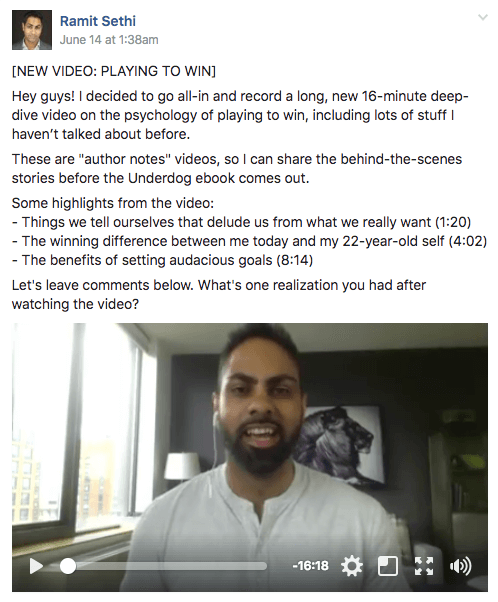
This post broke the ice in a huge way, and at the time of writing it had over 40 extremely detailed, honest and vulnerable comments.
What was interesting though, was that no one was starting new threads, or engaging outside this thread. It felt as if people didn’t know what else to do, or didn’t want to do anything wrong.
Pop Quiz: So what would you have done in this situation? Would you have posted more of these video threads? Would you have called people out? Perhaps you would update your guidelines to ensure that everyone knows what they can and can’t do?
Well…Ramit didn’t do any of those things.
What he did was to call out the limiting scripts (mental BS) that was holding people back from participating. He hypothesized as to WHY people weren’t interacting and in doing so…he created space for people to self-identify and participate.
Check out this beauty of a post:
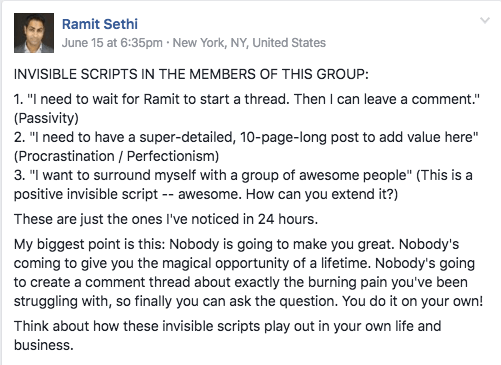
In less than 48 hours after posting this, the community exploded with interesting, vulnerable and value packed posts.
So much so Ramit later posted this:

In this case, helping people identify how they are feeling and what’s holding them back (limiting scripts) allowed them to engage in the community. It was a pleasure to witness.
How do I get over that initial awkward phase when the group is really small?
First off, you need to set the foundation of the community. You need to have the structure created and explained so that when members arrive all they need to do is jump in. They’ll be clicking around, reading instructions/guidelines, watching how to videos and taking their questions to the right channel (slack), or thread (Facebook).
The last thing you want is for your members to get confused or overwhelmed by Facebook or Slack.
I work with entrepreneurs to assess what their time resources are, what the goals are for their students and themselves for the course and we work step by step through the foundation. In as little as 45 minutes you can walk away with a plan that explains exactly what you need to have in place BEFORE you go live. Grab my kick-start your community in a WEEK (or less) bonus to walk through the process step by step.
[x_button shape=”rounded” size=”x-large” float=”none” href=”https://www.dianatower.com/ug-landing-page/” title=”Grab your FREE BONUS!” target=”blank” info=”none” info_place=”top” info_trigger=”hover” lightbox_thumb=”http://www.dianatower.com/wp-content/uploads/2017/06/Screen-Shot-2017-06-22-at-10.25.03.png”]Grab your FREE copy![/x_button]
Once you have the fundamentals set, you can focus on the initial awkward phase. If this is a course that has weekly calls, you won’t feel this as much. Also, you will feel it less in Slack than in Facebook. Facebook is more social and all over the place (in terms of the feed), so you will notice that the group is small or quiet more, than in Slack (which feels more like a forum).
One of the best things you can do to kick things off is to create a welcome/introduce yourself channel or thread.
One tip: Rather than only focusing on introducing themselves, ask them to share what they want to get out of the group. Just like Alp Turan from www.trialandeureka.com does in his FAST50 community.
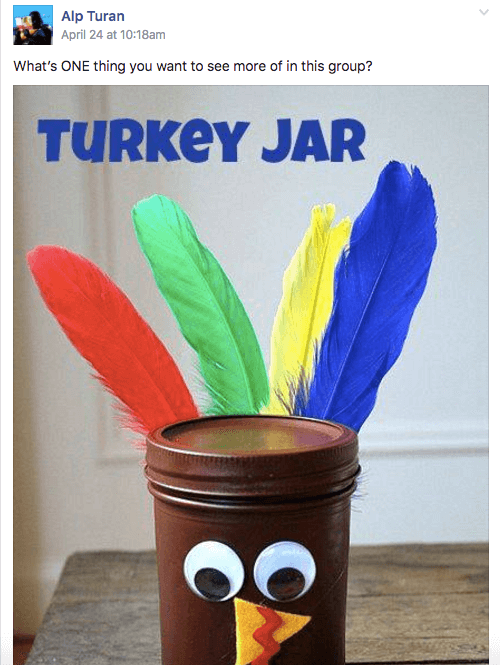
Rather than simply saying, “I’m Diana, I was born in Moose Jaw Saskatchewan and I am a strategic community manager that lives in the south of Spain.” I would also add what I personally want to get out of the group. Which is something EVERYONE can connect on.
Maybe no one else is a community manager or was born in Moose Jaw but they sure as hell want to get more opt-ins on their homepage in this group.
Check out my first post in FAST50. Not only did I dive right in and connect with others, Alp snuck in some customer research as well. Yet another benefit of having a community for your paid course…getting real time feedback so you can improve your course for version 2.0.
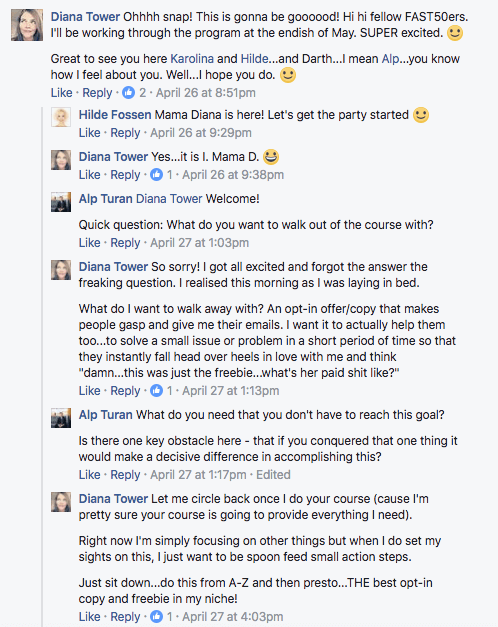
Chapter 9: FAQ (Other shit you need to know)
There are many ways that you can use your own community to drive your business goals. A lot of people think that community is simply about engagement and supporting others, but without strategy it's essentially dead in the water.
How to get compelling testimonials without having to ask for them
Once you set up and establish your community, it can be the perfect place to generate and collect testimonials from your paying clients and members.
First of all you can review your community and collect any testimonials that pop up naturally. Simply grab a screenshot of the testimonial and save it in a Google Doc folder.
Make sure you name the image specifically so that you can search for it and find it easily. This will save you a shit load of time down the line when you have 500 screenshots and you just want to find the one that Bob left about coaching.
If you are creating a new product and want to add testimonials to a sales page or your website in general, you can also just ask for them.
Hold up. You aren't going to go post in your community and say, “Hey guys, I hope you're having a fantastic day. I'd like to extract specific testimonials from you guys today, so if you could comment on this thread and basically fan girl me, but with specific tangible results that I've help you get that would be greeeeeat.”
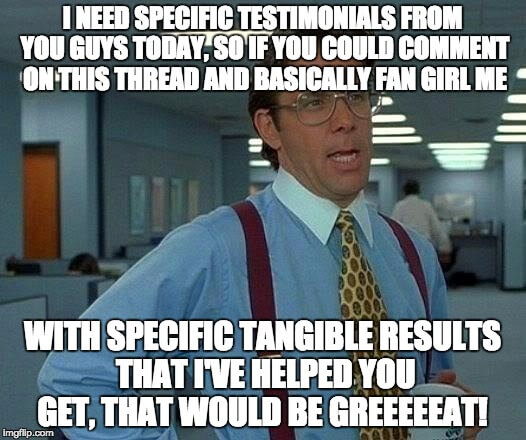
Please don't do that.
There are loads of ways that you can get testimonials in an authentic and caring way, here are just a few ideas.
- Simply watch for people complimenting the course or you and grab a screenshot.
- If you see a compliment then ask a question about it to dig deeper. Why do you feel that way? What about XYZ made it better or easier?
- Post in the community and ask people how they were feeling before starting or at the beginning of the course. You can ask what their struggles were and how they were feeling (this is great for before and afters). You can even circle back to that thread once the course is finished and ask people to reply to their initial comments to compare how they feel now.
How to ask for permission to share testimonials.
Here's the thing, if someone posts something in a group, they are probably doing so because it's a safe place and they feel comfortable doing so. So don't go and break that trust by screen-shoting their posts and then plastering them all over your emails, twitter, Facebook and sales page without asking them permission or letting them know first.
There are several things you can do to make sure you don't break the trust you've worked so hard to build.
Fuzz out their image and name from the image. You wouldn't need to get permission in this case, though personally I would ask either way. (Check your local laws as well on this).
Wait…you want me to show you how to fuzz out their image or name?
Your wish is my fairy godmother command.
How to fuzz out a picture, or a name from screenshots.
There are many ways to do this but here is what I do. It is quick, easy and did I mention quick?
- Go download “Skitch” from: www.evernote.com/skitch. It was created by the makers of Evernote and it’s an awesome free tool.
- Launch the program and drag your screenshot image into the gallery of notes. Fun fact: you can also use this tool to take your screenshots for you. It really is handy dandy.
- Double click on the screenshot you want to work with.
- Using the tools on the left, select the pixelated tool.
- Select the area you want to pixelate and presto! Done like dinner.
- If you are more visual, check out this quick 2 minute video tutorial I made for you.
What happens if they say no?
What you could do is fuzz our their picture and name, or simply quote them, without including their name, image or anything.
This is better than nothing, but loses the impact of using a screenshot. It also might lead people to think that you might have simply “invented” the quote or testimonial.
How communities can create armies of raving fans for your business
Um…free promotion…yes please!
This is pretty much any entrepreneur’s wet dream. You wake up and hop in your community and one of your students has gone in and shared her #1 take away from module 4 AND shared how by doing the steps that you outlined in the course landed her a promotion, a new client, a successful launch etc.
Not only do you feel amazing (your course is really helping others succeed), you are so thankful that they are sharing their results in the community.
Here's the thing, having these stories is always a win for you. If it's in the course community, then others will be inspired to stick with the course to get similar results.
Then from there you can make this even more powerful. You can reach out to that person and do a full case-study on them for your site (writing an email to your list, posting on your blog etc) and you could also take a screenshot and add it to your sales page. You will need to ask for permission though, which isn't complicated at all when done right (as I outlined above).
Your own personal think tank to generate your next course & coaching products.
This is a fantastic advantage to having a community. A lot of entrepreneurs get stuck trying to figure out what they should do next in their business when all they need to do is simply ASK their audience.
Simply email them or post in your community and ask them 2 questions.
- What would you like to see happen/learn here?
- How would you like to feel when in the community?
The answers to those questions are SO incredibly important. Actually…if you would like to do just ONE thing to create an amazing community. Ask those two questions. That’s what Tree Franklyn did!
CASE STUDY: How Tree Franklyn identified the #1 emotion to trigger
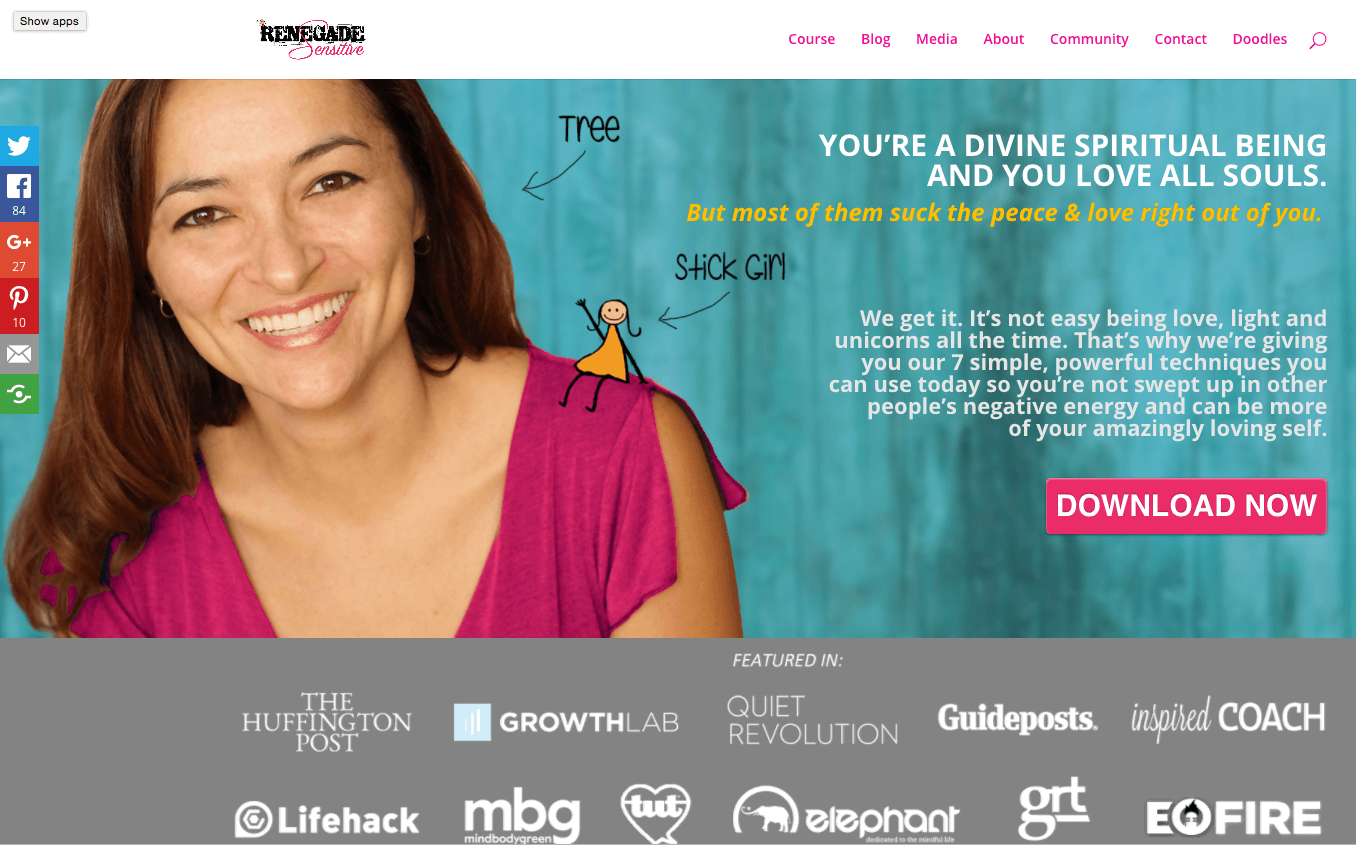
Tree Franklyn is the wonderful woman behind findyourinnerhappy.com, where she helps highly sensitive introverted women manage their overwhelming emotions so they can use their sensitive traits to stop hiding and start creating the life they want.
She came to me a while ago asking about her free community, Renegade Sensitives.

My first question…should she have a free community?
- More than 1000 subscribers? Check!
- Course with more than 4 modules and a bonus community just for those clients? Check!
Excellent.
So we moved forward.
Tree was struggling with her community. She didn’t know if she was doing things right and how she could optimize it. When I asked her how she got started or what her plan was I wasn’t surprised when she said she didn’t really know. She just did what she had seen in other groups she enjoyed.
Despite her group growing steadily,
“hardly anyone was posting, and when they did post, there wasn't a lot of engagement. Some posts didn't get any comments or likes so I felt that I needed to jump in and comment so that they wouldn't feel ignored/left out”. – Tree Franklyn
This is more common than people realize.
“The biggest mistake I made was thinking I knew the reason my members were in my community. I based this knowledge on the emails I received. But did not consider how the ones who DIDN'T email me felt. Also, the way I worded my guidelines was a little scary, I didn't realize it could've been intimidating to my members”.
How to quickly learn how your members want to feel in your community.
The #1 thing that we changed was the emotion she was triggering in her posts, comments and all interactions. She thought she should be making her members feel “supported” but after asking her audience (via a simple poll) she discovered they wanted to feel “connected, Understood/Validated and Supportive/Helpful.).
How did we figure that out?
I got her to set up a poll in the community, asking her members how they wanted to feel while in the community. Simple as that.
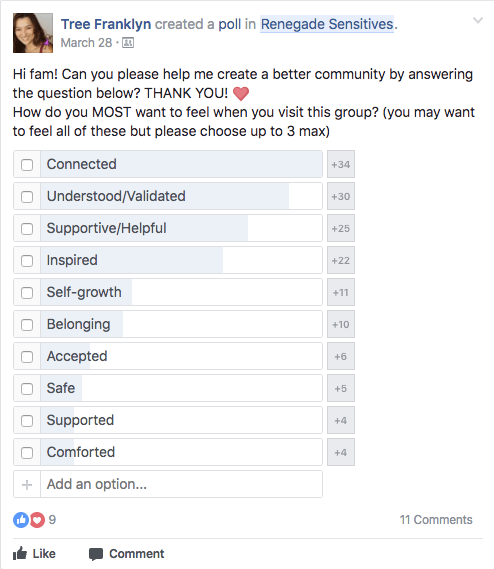
Knowing this about her members, she could then decide what tactics and actions she would make in her community, in order to make her members feel those emotions.
Doing so would allow her to say no to some activity and double down on others.
I followed up with her a month or so later, to see how things were going in her community and she told me that,
“Unfortunately I have not visited the group lately. I haven't done anything about the poll I conducted and I think there's more engagement but still not much. (sorry, it hasn't been a priority)”.
I wasn’t too surprised by this.
Why?
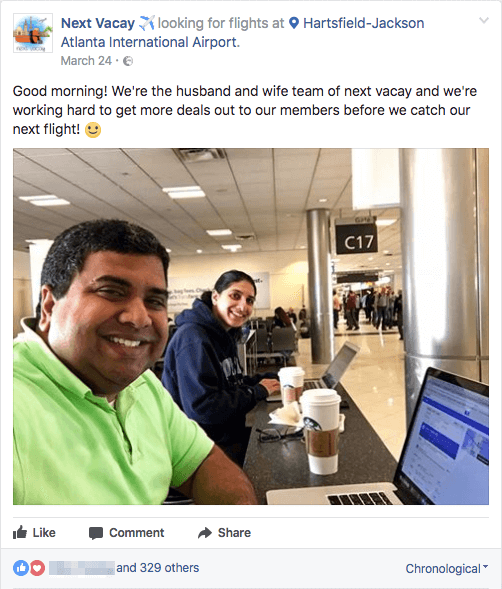 Because many free communities aren’t a priority when it comes to business. They’re created to allow people to “engage” but there isn’t really a strategy or plan behind it or a clear ROI, so it becomes a time suck rather than an asset.
Because many free communities aren’t a priority when it comes to business. They’re created to allow people to “engage” but there isn’t really a strategy or plan behind it or a clear ROI, so it becomes a time suck rather than an asset.
My good friend Naveen Dittakavi, founder of NextVacay.com knows his stuff when it comes to community and he’s not creating one for his business…yet.
Naveen was featured on Andrew Warner’s Mixergy podcast and shared insights into How to run an engaged, organized and useful Facebook community, so it isn’t that he doesn’t know how, but rather he knows that there are other things he can and should be doing first to grow his business beforehand.
He’s going after the “low hanging fruit” first before he even thinks about a free community
This is exactly why I encourage entrepreneurs to focus their community building on groups for their paid courses and paying clients first, as there is a clear ROI for them.
It’s easier to overdeliver for those paying members as they are all working towards the same specific goal (completing your course) and the community serves as a place to add value to your paying clients, that will more than likely buy from you again. Repeat customers in da house yo.
So what should Tree do with her group?
To be honest…I would recommend closing it down. Unless she can see that the group is helping her make more sales or bring in new clients, I would close it and focus her time and energy on other areas of her business and over delivering in her community for paying clients.
What about you?
Do you have a free community that is sucking up your time with little to no ROI? Seriously consider killing it. I know that it might feel difficult or like you’re letting people done but if you explain why and how you’ll be refocusing your time on energy on more important things…they will respect you for it.
Community done right, you may never need to create a free community.
Your vaccine to writer's block.
I wrote the majority of this guide in an Irish pub in writeordie.com.
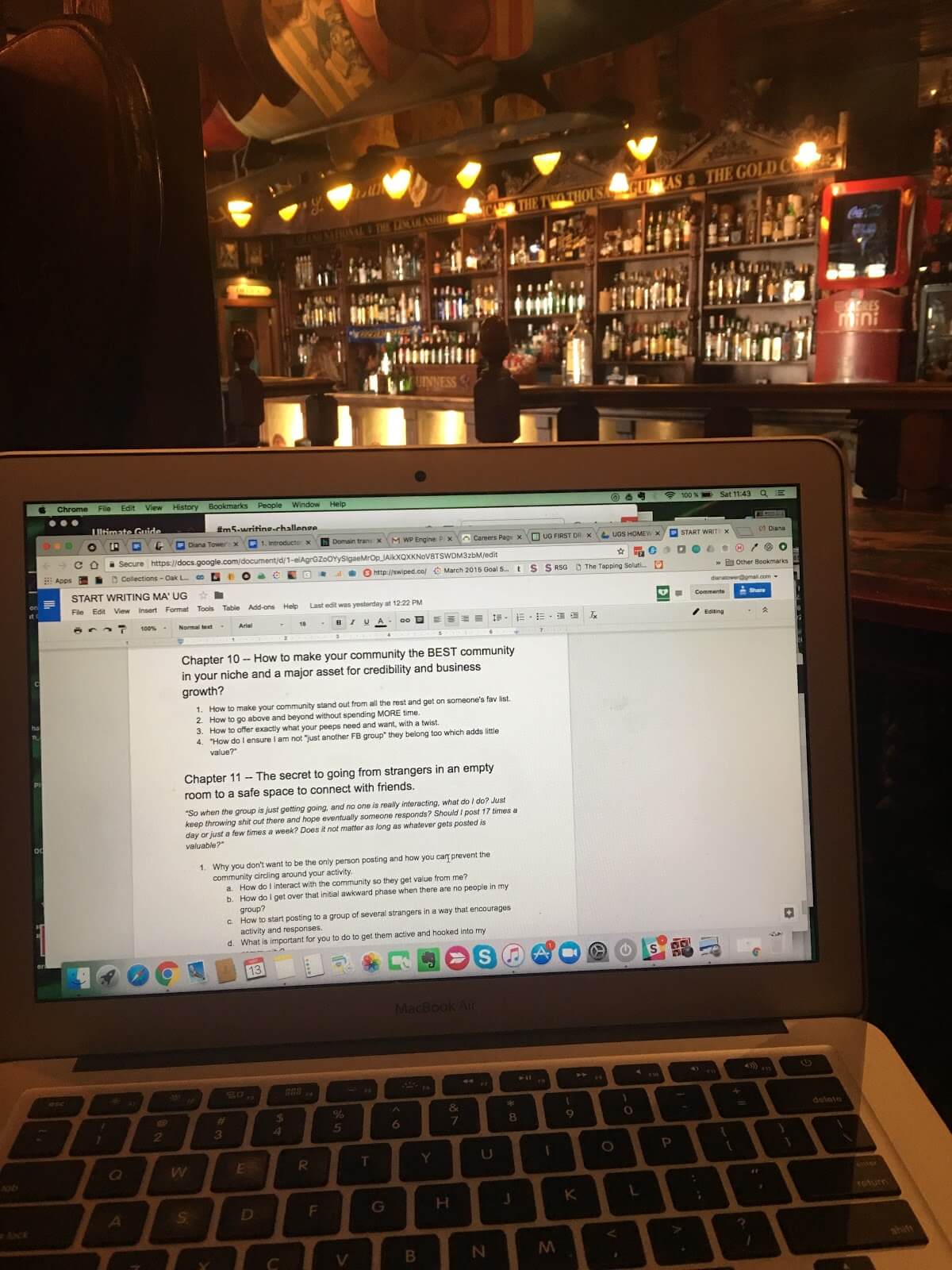
When I stopped typing, my screen turned red and alarms went off. AWESOME!
It's pretty motivating to get me to write and thankfully I already KNOW what I am writing about. You see, I created a super detailed table of contents before I even thought about writing and had my audience review it for me.
I asked them if this looked interesting, what was missing and what I should expand on. So then I simply needed to write based on my table of contents. The same applies to your business.
Creating content for your business can feel overwhelming and frustrating. You might be struggling to come up with content ideas that your audience will actually find useful.
You want to optimize your time and make sure you spend it creating content that really stabs your audience's problems in the heart…like a splintery wooden stake. Your writer's block is obviously a vampire…a time-wasting vampire.
So what's the splintery wooden stake to your time sucking “writer’s block” vampire?
Asking your community members what they would like to read about.
I shit you not. It really is that simple.
Just jump in your community and show that you care about your members and that you'd like to offer them even more value.
Selena Soo did this in her community for Impacting Millions as well. She posted her question and got over 20 detailed responses from a group of just over 300 members.
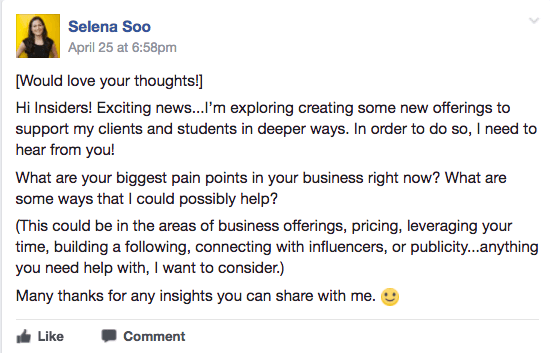
Now all she needs to do is review the responses, see what the trends are and choose where to focus on next.
Maybe she is planning a new product, perhaps she wants to write another epic guide like her ultimate guide to meeting people at events. Or maybe she simply wants to find content to write for guest posts on other websites to get more media and publicity attention for her business.
Community Spotlight: What Selena Soo is doing right with her Impacting Millions community.
Selena Soo is the super connector behind SelenaSoo.com. She helps experts and coaches get publicity and master their Business Strategy.
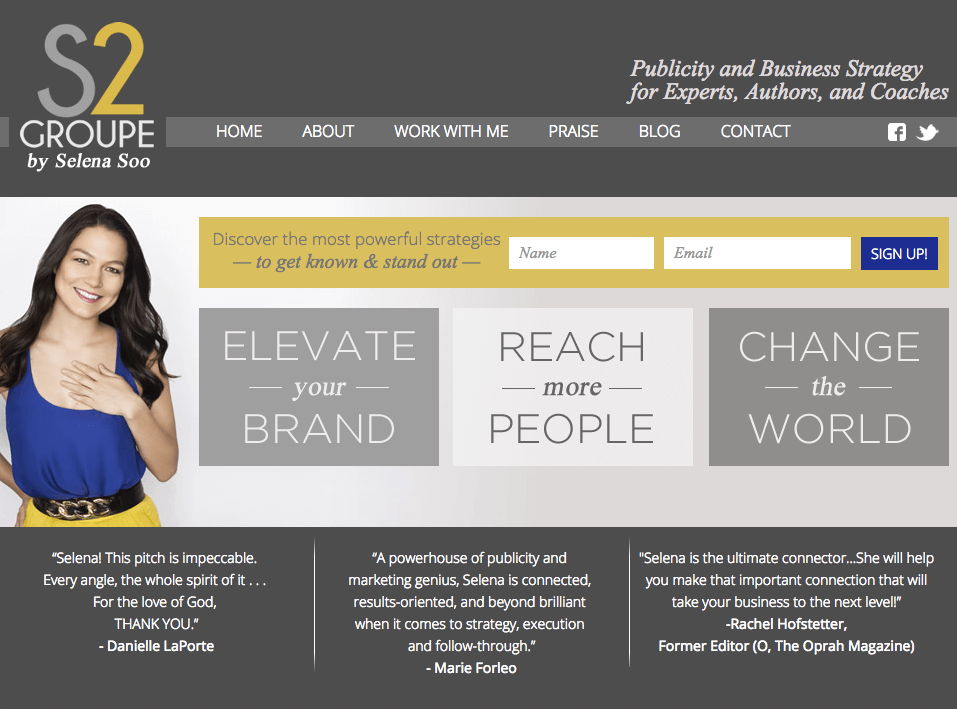
She has 3 outstanding courses, and one in particular stands out for me, as I am a student; Impacting Millions with the Impacting Millions Insiders Circle community.
Impacting Millions takes entrepreneurs by the hand and shows them exactly how to approach the media and how to present themselves in order to land business changing media opportunities. Everything from guest posts and podcasts to magazine articles and TV appearances. Selena shows you how YOU can do it too.
A huge part of her program is the Impacting Millions Insiders Circle, Facebook group that students get access to for a year. This is where her students get to reach out for support from Selena herself and other members. Students can get eyes on their media bios, see if their websites have enough credibility markers and also share their wins when they land an opportunity.
For example, I reached out for feedback on my bio and not only did over 10 people share their insights with me, so did Selena.
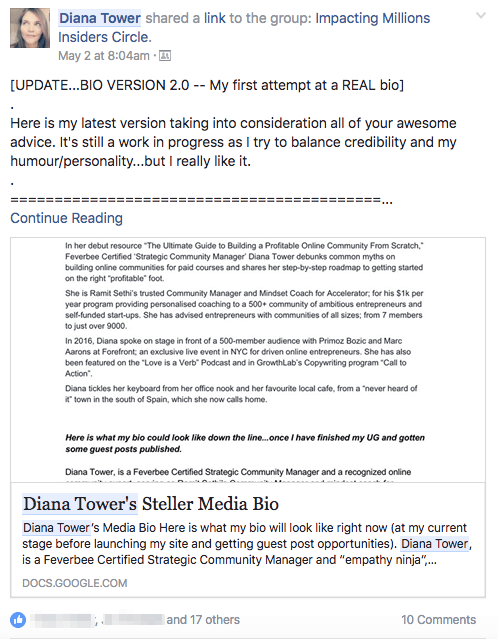
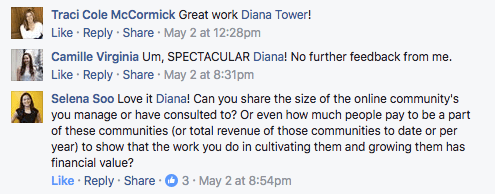
Speaking as a student, the community keeps me coming back for more. It reminds me about the course and draws me back in and helps me stay on track. If the course were simply the live webinars every 2 weeks, I would most likely not keep up and I’d “shelf” the material for later.
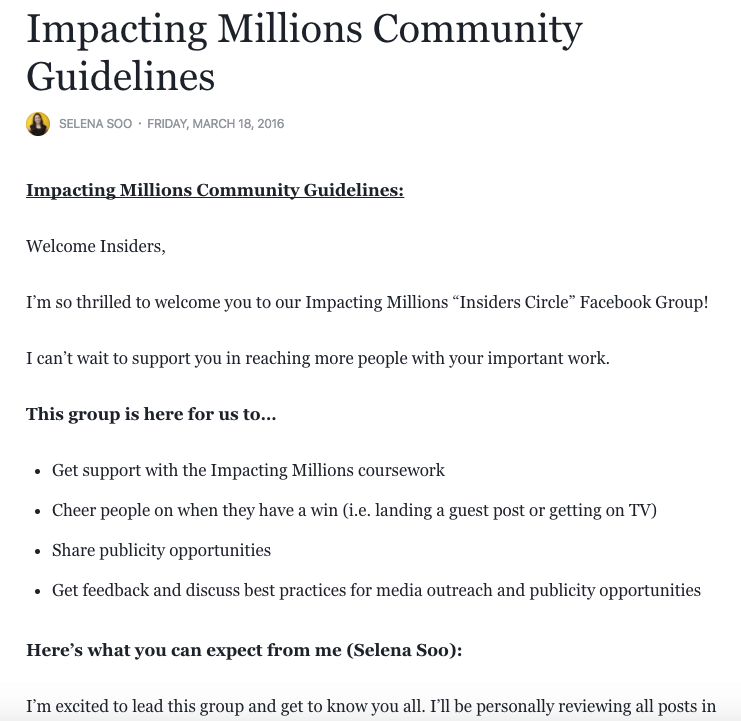 Seeing others write their bios and share their wins plants a seed in my brain. It makes me want to accomplish that as well.
Seeing others write their bios and share their wins plants a seed in my brain. It makes me want to accomplish that as well.
The community is also well organized and it’s guidelines are established from day one.
Selena and her team created a Facebook doc to present the guidelines and even went so far as to ask everyone to like the doc once they had read the guidelines.
Community is a powerful thing when done right, and Selena is doing community right. Her community is making it easier for her students to succeed. And when your students succeed, so do you.
I was lucky enough to be able to ask Selena a couple of questions about her Impacting Millions community, to share her perspective as an entrepreneurs and community host and she shared some super insights into how community supports her paid program.
Why did you decide to have a Facebook based community for Impacting Millions Selena?

“There are a couple of reasons, but when it comes to reaching lots of people and ultimately millions of people, it’s a marathon not a sprint.
I didn’t want the program to just be a bunch of content for a couple of weeks and then that’s it. I really wanted to encourage people to complete the program and be inspired to do the course work.
What’s great about the Facebook group is that I can take things from the course script, the webinar script and from the resources and I can drop it in the group. Sometimes people need to hear and see things more than once. Maybe they’ll see it on the webinar and then see it again in the Facebook group and that’ll really help it stick.
Other times people aren’t listening to the webinars at all and there’s just in the Facebook group, so they’ll see the “today’s tip” or these key learnings and think “Oh my gosh this is great stuff” and that actually inspires people to dive into the webinars and complete the course.
The Facebook group helps enhance student’s learning and some people digest things better reading vs listening, so we’re giving people different formats.
The other thing is that it’s really easy to get distracted in business. There are lots of things that you could be working on. When it comes to publicity and building your brand, it’s something that is important but people can sometimes put it on the backburner.
So when people are a part of a Facebook group, and they are seeing their peers achieve all these great publicity wins. Like someone saying:
“I just started my business and now I’m on the huffington post.”
“I did my first podcast interview. I was scared but now I feel amazing”.
“I got my first 30 subscribers ever, from this media opportunity”
That’s really going to inspire everybody else, and that’s another reason why I have it, it inspires people to take action, when they see everyone around them is.
I also did a Facebook group because I wanted to, from time to time, be able to share opportunities in the group and also have other students share these opportunities. Having the Facebook group is great for that.”
What is the biggest benefit for you (and/or your students) from having the community?
“It’s staying connected with people. Last year we had just over 200 people in Impacting Millions, and we had close to 400 posts in the Facebook group where people were sharing media wins, and some of those posts were “I’m doing these 5 podcasts”.
Part of it [the success] is because I try to keep everything engaging.
- I did the course live,
- I was active in the facebook group,
- we had monthly media mentor webinars (so every month people had the opportunity to get feedback),
- people getting inspired by other people’s media wins so they were trying it too,
- we had students partner together and do guest posts together where someone would write an article for Mind Body Green and weave in advice from other Impacting Millions students.
It’s the results that I feel very proud of because there are a lot of programs where students don’t complete the program.
With Impacting Millions, I don’t know the exact numbers but I’m pretty sure our completion rates are a lot higher given just we have a lot of people showing up for the webinars. Most recently I was checking in with people, and saying “how many have you been to?” and a lot of the people on the webinars had been to all of them
I think the biggest benefit of the community is that it facilitates results.”
Top tip from Selena Soo
“With the live webinars, I always encourage people at the end to share their biggest takeaways in the Facebook Group because I really feel like when people share their biggest takeaway is it really cements what they learn, inspires everyone else in the group to listen to the recording when it’s available, it creates engagement.
Even if people aren’t able to put things into action right away (some people are still working on their website, or finishing up a certification in their area of expertise and they just feel like they don’t want to take action right away with pitching) but their attending the live webinars and sharing a top takeaway and they feel like they are accomplishing something and things are in motion.”
The size of your community ISN'T everything.
That's right. You can pack up your “community” envy and leave it at the door. In fact, that brings a whole new level of issues and complications that you'll eventually need to take on.
This is something I'll be covering in a future guide or course (growing your community) but for now, don't assume that bigger is always better.
Big community can mean bigger issues. Problems that you don't need to worry about right now but it's a great reminder that bigger isn't always better.
So what about you? You're just starting off and you have maybe 100, 50 or even 10 people in your community.
Should you be embarrassed? Hell no!
Will people be able to actually get value from a group this small?
My answer is an emphatic YES. I have two personal examples as well. One on Slack and one on Facebook.
Small Slack Group
In 2016, was a part of “Insider’s Club” a course and group coaching program from Primoz Bozic, with 3 other students.
In an email that Primoz sent out to his list with the subject line:

…Primoz shared how the launch didn’t go as he had hoped:

I’m sure you can relate to those feelings as a fellow entrepreneur, but what did his students think?
As one of the 4 students, when I heard that there were only 4 of us, I thought that it was much smaller than expected and yes…it caught me off guard.
As we worked through the program though, it was clear how amazing this program was and it provided 10x the investment. Not only did I get to connect with my peers on a much closer level, I also got to work much more closely with Primoz (which for those of you who know him and the effect he can have your business…that was huge).
My fellow classmates shared the same sentiment.
“My Initial reaction. WOW!! This is a small group which you don't get often.
Second thought. This is an extremely rare opportunity.
Working with a small group is a different dynamic. Everything was more flexible, tailored to the group's experience, we made faster progress and not to mention the rare opportunity where you pretty much got 1-on-1 access to Primoz.
For example, Primoz actually asked us every week when we were free for the call, making sure to accommodate 4 different time zones.
Tailoring the course to our specific needs and requests. One of the requests was “How to Find a Mentor” which resulted in a dedicated lesson that was not part of the plan.
1-on-1 access and answering all the questions we had no matter how long they were sometimes.
Because of the small group and increased dedicated time to each student, we made faster process compared to larger groups.
It truly was a great experience and privilege working with a small (and not to mention AWESOME) group.” – Nicole
**********
How did you feel when you discovered Insiders club had only 3 other members?
At first I was frightened. I was hoping to soak up Primoz's knowledge so I could apply it in my own time, or consider how I was going to apply it… a smaller group instantly meant I couldn't be passive. I was going to have to contribute.
Initially when I signed up I also didn't know if I would have the time to commit to attend the calls (due to timezones) and a smaller group would mean I would have to attend. I felt a bit of pressure to be present.
And then, I was worried. I'd looked up to Primoz and all of a sudden he was going to talk to me… what if he didn't like me, what if no-one in the group liked me? You can't hide in a smaller group at all.
What was it like working through the course with a small group?
After all my fears, working with a small group was amazing. We got to know each other really well, we could interact with Primoz and ask him specific questions. We even got to tailor the course a little as well, with Primoz taking suggestions for content based on our needs at the time.
I didn't just complete a course, I made a new group of friends who understood me and could give me advice specific to the issues I was having.
What were the benefits (from your perspective) of being in a small group?
Being in a smaller group and having to contribute, I got a deeper understanding of the content and it's application than if I had worked through it on my own. I actually made progress which I probably wouldn't have done if I'd been passive.
Also the support and camaraderie which came from working in a smaller group. I'd love it if all courses I took were that small, intense and focused.
Finally, I established friendships which hopefully I'll have for a very long time.
– Rachel Liley
**********
How did you feel when you discovered Insiders club had only 3 members?
“I thought tons of people were missing this opportunity, maybe Primoz messed up his launch but it would be better for us in the end as we'd have a big accountability this way.”
What was it like working through the course with a small group?
“We (the participants) were closer than we would have been in a bigger group, you couldn't miss a lesson (or you'd be caught!) or miss your homework so we improved faster. And we could go deeper on our own current cases.”
What were the benefits (from your perspective) of being in a small group?
“More work, more fun.”
-Geraldine, Founder of www.commeunefrancaise.com. Where she – your Frenchie spirit guide to culture, life and language in France – helps francophiles go far beyond anything they’ve learned in school.
So you see, students and community members don't care about size, they care about solving problems. If you can do that in a small group then you'll nail it.
Another example is Hilde Fossen, my personal stylist and the founder of www.getstyleconfidence.com.
I was a beta student in her first online program, of the same name and while the course was absolutely top notch and totally changed the way I think about style and the way I dress…the magic happened in the community.
It was a small group of 12, and it was the perfect safe place for us to test what we were learning. We each created a thread to share our outfit photos and within minutes of posting you would get feedback from either Hilde or another member who had taken the course too. It was amazing.
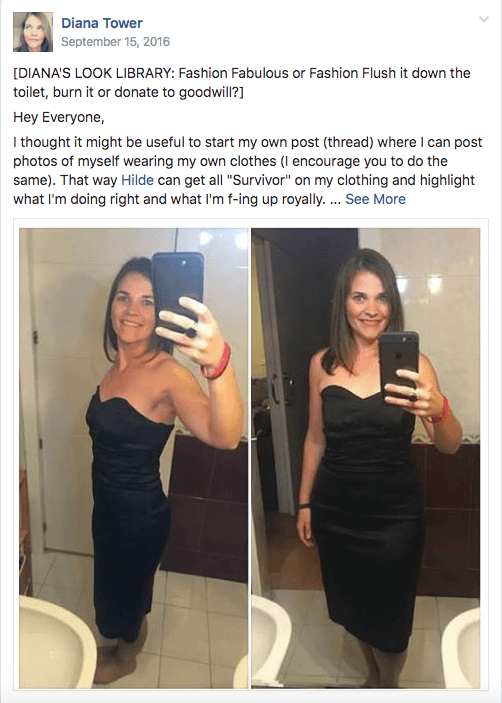
I remember having a digital fashion show in the changing room of a shop when I was buying outfits for Forefront; Ramit Sethi’s live event. I was trying on dress after dress and Hilde and 3 other members were commenting live. It felt like I was shopping with friends and that made the process not only more productive but FUN!
Here are what a couple other students said about the community.
“I've been in several programs before with this size group (yoga teacher training, BS in Engineering graduating class). I like it the most because it's the most intimate. You really get to know the other participants and relationships build faster because you have a common agenda AND there aren't a ton of people to keep up with.
Working through the course with the small group helped me form “fashion bonds” with several of the women.
The benefits are: very specific and in depth conversations without the fluff, easily to continue bonds beyond the course with several students without the overwhelm and it's easier for everyone to speak up because you know the other participants intimately in this goal.”
– Amanda Smith from www.solacelessons.com
**********
“The small size also makes it feel exclusive.
It was a small enough group that I felt I could open up and not have half the world judging my stupid style choices. I think it helped that I already “knew” half the group and we had a common goal (Forefront) to work towards. I made a couple new virtual friends as well, which I actually tend NOT to do in the bigger groups.
For me, [the benefit of the smaller community] was the trust factor, and the knowledge that Hilde would actually see and respond to things I posted. As a group gets bigger it gets harder to feel the love from the “owner” or whoever started it (Bushra is an amazing exception, I don't know how she does it!). Knowing I could tag 3 or 4 of you in a post and Hilde would spent a good 1/2 hour on finding things for me and you guys would comment in supportive but honest ways was really great.”
– Jessica Philippe from uptrovert.com
So as you can see…size does not matter, and can actually be an asset for you.
In a small group you are able to connect personally with each member and can foster a group of advocates and raving fans that will naturally promote you and your offerings simply because they adore you and know the impact that you can have on the lives of others.
How to make your community a major asset for credibility and business growth?
This is an interesting Q because many of you fine peeps probably were thinking of creating (or already have created) the next 60 second persuasion group. An open FB group; where you dreamed of eager potential buyers flocking to it, in order to interact, engage and eventually buy yo’shit.
The problem with these groups is that most of you probably SHOULDN’T be creating an open community just yet. An open community is basically having a baby…but there are some steps you need to take before you get there folks. It’s basic rules of reproduction.
Yes…I am going to compare your community journey with your sex life/reproduction journey.
- STEP 1: Pop your community cherry with a paid course bonus community.
- STEP 2: Practice making a baby (sexy time) by launching and adding new members into the same community.
- STEP 3: Pull the goalie and create an open community baby
- STEP 4: Become a proud grand-mami or papi and enjoy the shit out of your paid membership community grand-baby.
Translation:
- STEP 1: Start by building a course bonus community.
- STEP 2: Grow that community as your relaunch your course.
- STEP 3: Once you have 1000 raving fans, you can think about creating an open Facebook Community (to grow your list further, establish yourself as an expert).
- STEP 4: Then you can throw the “holy grail” switch and create your paid membership community.
So now you can see that when getting started you should focus your efforts on creating a mind blowing course community for your paying clients.
Why do we start here and not jump to an open community?
You blow them away time and time again so that they appreciate and adore you.
Then, each time you launch you bring in more awesome people whom your founding or beta students “show the ropes”. You essentially create a “raving fan” factory that transforms hopeful customers into raving pom-pom shaking fans for life, who will promote you and your courses without even realizing it.
You will come up in conversations, and social media posts, organically and naturally. The best kind of testimonials and publicity. No money can buy this kind of buzz.
How to make your community stand out from all the rest and get on someone's fav list.
Here’s the thing. We are bombarded with noise all the time. We can’t escape it either because it follows us on our computers, phones and now on our watches too! Everyone is turned on 24/7 and it’s hard to concentrate when you’re always ON!
So when you create your Facebook or Slack community, you need to sit back for a moment and think about how you can stand out.
- What can you offer or do for your students that no one else is doing?
- How can you make your members FEEL the way they want/need to feel to keep them coming back for more?
- How can you figure out how they want to feel in the first place (I have my ways…do you?)
- What are your superpowers and how can you use them to add even more value to your groups.
For myself, I offer friendship. That’s right. When I am in a community or running one, I pour myself into it. I become that friend that is along side you for the ride. That you can turn to for help, support or simply bounce ideas off of. I create silly memes, GIFs and cheer others on.
Why? First, because that’s just how I roll and I can’t help myself. Second, because I know how hard some of these processes/courses can be and having a friend in your corner who gets it can go along way.
So what can you offer your members? Make sure to do that and then some.
How to go above and beyond without spending MORE time.
Sure this all sounds great, right?
- Go above and beyond, she said.
- Use your superpowers, she said.
- Make people feel amazing, she said.
Um, doesn’t that mean that I’ll be stuck in my group 24/7 cheering people on and flexing my superpower muscles?
Hell no.
In Chapter 6, you assessed how much time you have to dedicate to this badboy and you aren’t going to budge on that.
You decide upfront how much time/resources you have to dedicate to your community and will create your community strategy accordingly.
If you have 5 hours…you’ll spend 5 hours. Period.
Offer exactly what your peeps need and want, with a twist.
We’ve already covered how to figure out what people need and want, but what about the TWIST. How can you be different and make your group stand out. How can you ensure that you’re not “just another FB group” they belong too which adds nothing to their life?
Be unapologetically YOU.
- If you swear…fucking swear.
- If you are a excel nerd…geek it up a notch and create some sheets for yo’peeps.
- If you are a MEME and GIF ninja then drop them like they’re hawt!
The truth of the matter is that whatever you’re helping people with, they can get help somewhere else from someone else. So you need to provide something that no one else can…and in this case it is you.
You’re the weirdo twist that will make your community different, unique and sticky as fuck!
Chapter 10: What you’ve learned and what comes next?
So my little honey badgers (I’ve ALWAYS wanted to say that), you’ve come a LONG way with me and learnt a shit load about building a community for your online course.
We broke things down and looked at:
- what an online community is and what kind you should start with.
- a shit load of myths that make the idea of building a community feel like a visit to the dentist.
- how a community can be a great fit for your business, and also when it isn’t.
- How much time you can expect to be in your community, and set boundaries.
- Facebook vs Slack and which will do the heavy lifting for you.
- The strategy behind communities that no one is even thinking about, which will put you WAY ahead of your competitors
- Guidelines to repel trolls and assholes and what to do if some slip through the digital cracks.
- Ways to make your community stand out like a sore thumb, in a good way.
- How to make your empty community the seed to sprout raving fans that can’t help themselves from promoting your shiz-naz.
Feeeewwww. That’s a mouthful and a half. I’m honoured that you suck it out with me and made it to the end. Just reading this puts you light years ahead of the game.
So many business owners are trying to do community, but just aren’t doing it right. They start a free group, when they don’t even have a course. They jump the gun and get distracted with a time sucking beast that does little for their business.
That won’t be you though. You now know what you need to focus on BEFORE you start a community, what kind to kick off with and the fundamentals to getting started.
You’ve got a guide to keep you on track and focused. No winging it and blindly slapping together a community for you my friend. You’re too smart for that.
With the help of this guide, you’ll be able to build community for your course that knocks your customers socks off.
Cheers to you sir, madam, unicorn, love, dude, weirdo, chicken (with a British Accent), or whatever you want me to call you.
It was a pleasure creating this guide just for you and I truly hope that it demystifies the beast that is “community”. It’s really not the big bad wolf coming to blow your straw online business house down. When you build the foundation on solid ground that is.
Community is heart, community is friendship, community is human and community is what so many entrepreneurs are fucking up, and it’s my hope that this guide saves you and many other entrepreneurial badasses from F-ing it up too.
Hugs and Skittles,
Diana Tower
Online Community Strategist, Word Homie, and Empathy Ninja.
BONUS Chapter 11: How To Set Up A Profitable Community For Your Online Course in a Week.
Hey honey badgers,
You made it through the beast. You’re pumped. You’re going to set up your community, but you are probably thinking…
“Holy shit balls Diana…there is SO much information here.
How do I apply it all and not F this up”
Dude. I’ve got your back.
When I start working with clients on their community we hop on a call and work through some questions together.
The questions are designed to gain a better understanding of your goals, your resources and also your fears around building a community. On a 1-1 call we would work through these together and dig deeper, exploring your mindset, assumptions and beliefs to help you best approach building your community.
I understand that not everyone can work with me one on one but I don’t want to leave you hanging. So I adapted these questions to create a Do-it-Yourself PDF worksheet so you can work through them on your own.
This worksheet will help save you hours of time setting up your community and eliminate 90% of your doubts.
Here is what this bonus will help you accomplish:.
- You’ll know exactly WHY you are creating your community and how it will support your ROI goals for your business.
- You’ll discover how much time it will take each week to manage and interact (yes you do have enough time).
- You’ll decide between Slack and Facebook and feel confident as fuck about your decision.
- You’ll get a list of fundamentals that you need to include in your Facebook group or your Slack community.
- You’ll know specific threads and channels that your community needs and how to organize things to save your sanity and time.
- You’ll walk away with a community that is ready to launch and invite members into.
[x_callout type=”center” title=”Grab your BONUS and the PDF version of this beefy guide” message=”So you can set up your community in a WEEK or less!” button_text=”Grab your BONUS and PDF now!” button_icon=”500px” circle=”true” href=”https://www.dianatower.com/ug-landing-page/” target=”blank”]
PS: The first 100 people to fill out their worksheets and email them to me, will receive personalized video feedback on their community from me. I’ll look at what you’ve set up, suggest any additions or changes and make suggestions to make it really go above and beyond for your business and your members.
I can’t wait to help you launch your profitable online community.
Hugs and Skittles,
Diana Tower
Keep Reading...
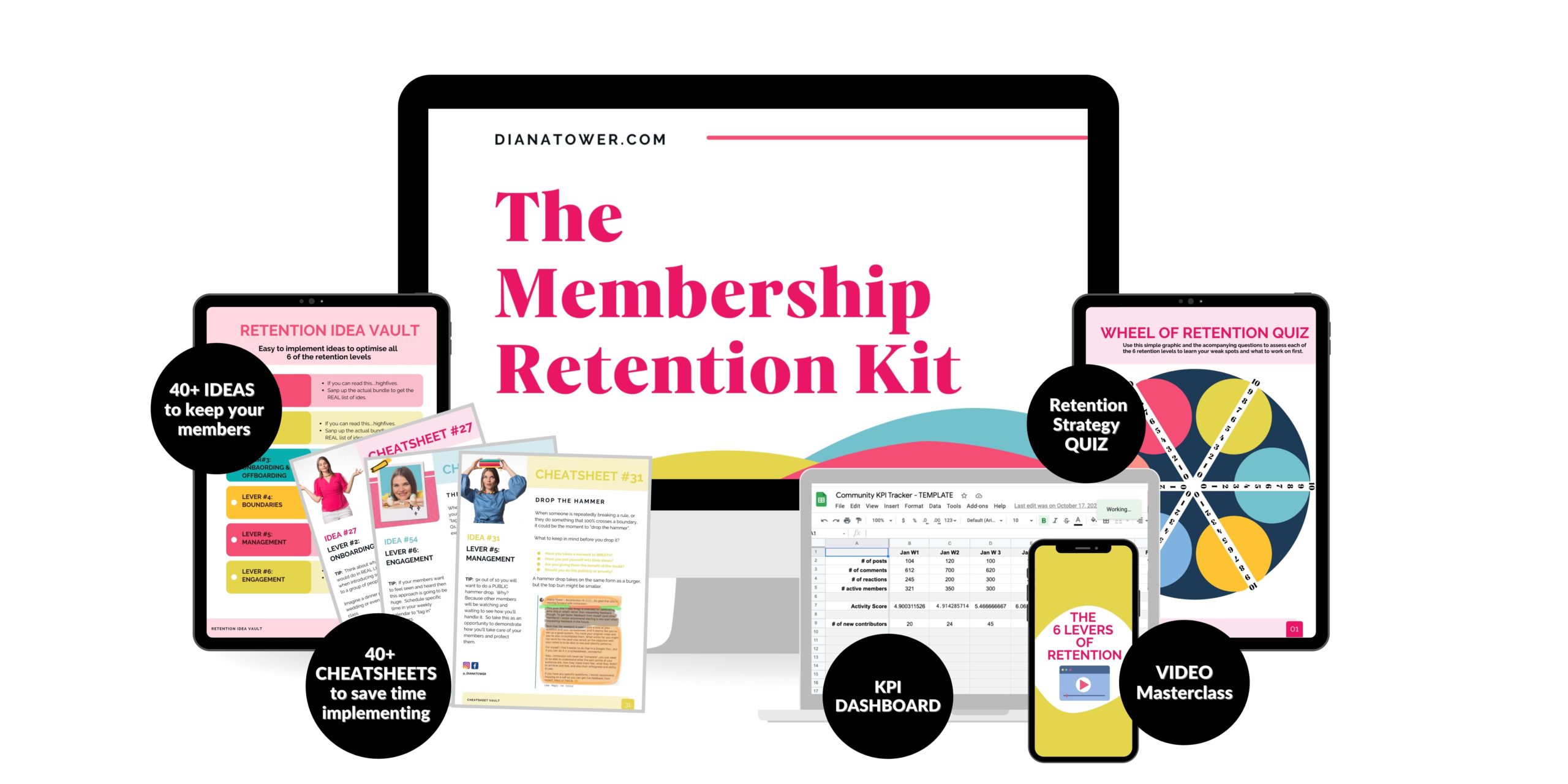

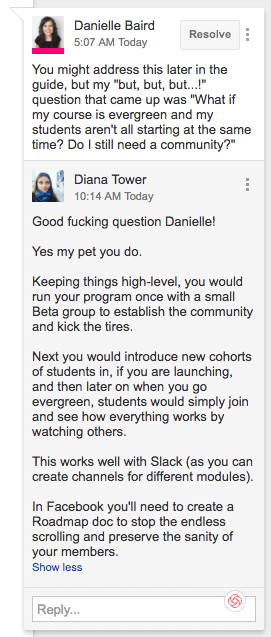

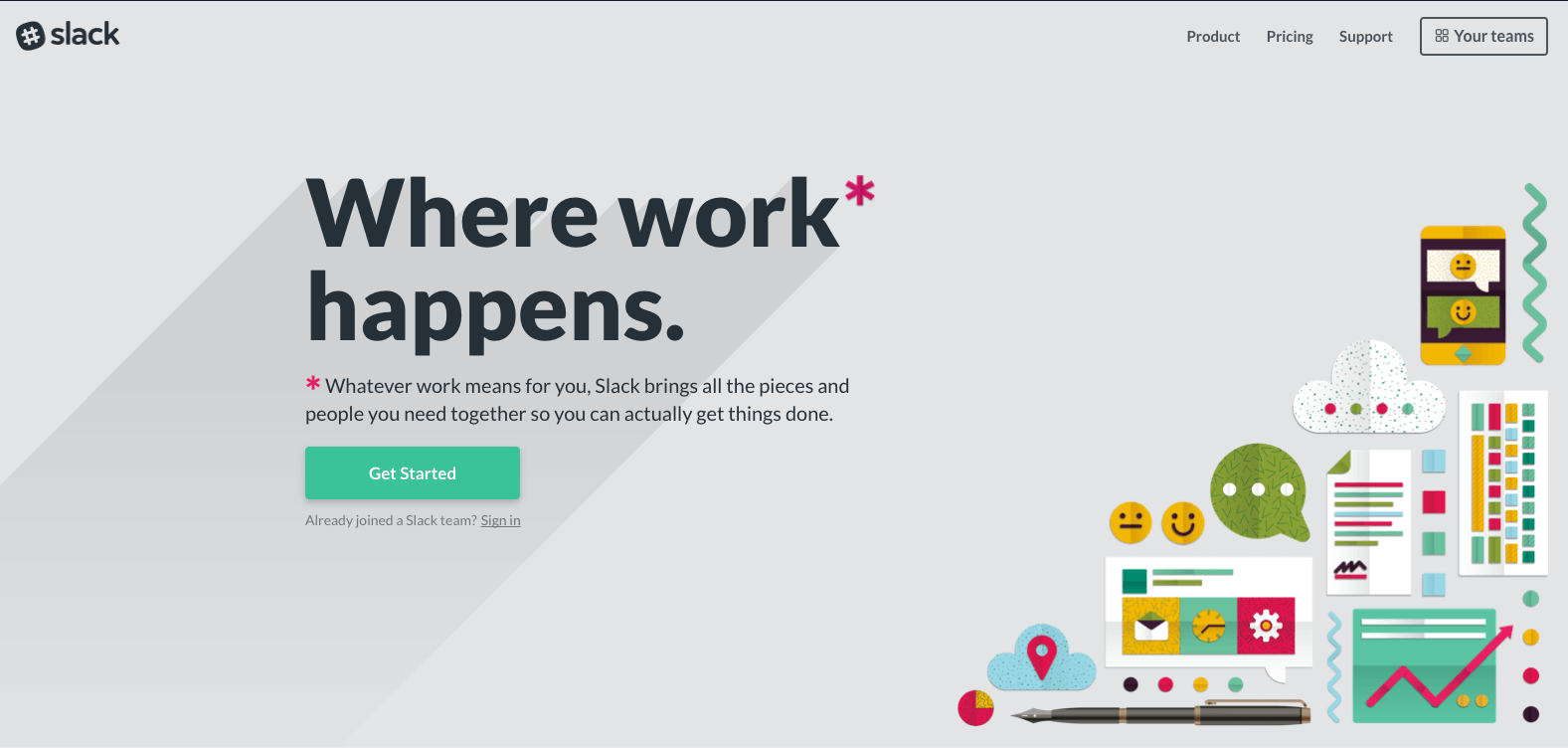
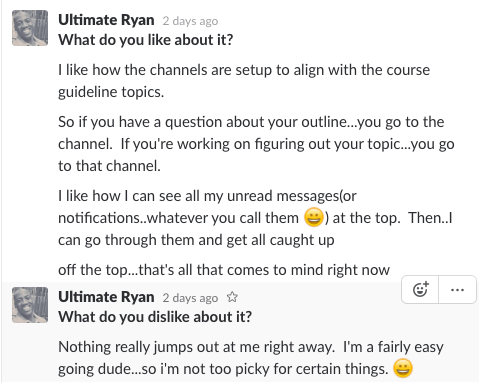



[…] My Ultimate Guide System student Diana wrote her Ultimate Guide to Building a Profitable Online Comm… […]
[…] She just published her Ultimate Guide to Building a Profitable Online Community From Scratch: […]
[…] The Ultimate Guide to Building a Profitable Online Community From Scratch […]
[…] Next, let’s meet the lovely Diana. Diana was also one of the first students to publish her guide. Diana specializes in creating guides on how to create and manage online communities. […]
[…] expert on creating profitable online communities after publishing her ultimate guide The Ultimate Guide to Building a Profitable Online Community From Scratch, which before joining UGS was just her business idea she did not feel was […]
[…] realized that Diana is REALLY good at building online communities. She recently wrote an incredible Ultimate Guide to Starting Your Online Community which is a phenomenal […]
[…] wrote her Ultimate Guides about starting a profitable online community and keeping an online community […]
[…] The Ultimate Guide to Building a Profitable Online Community From Scratch […]
[…] The Ultimate Guide to Building a Profitable Online Community From Scratch – Diana Tower (link) […]
[…] The Ultimate Guide to Building a Profitable Online Community From Scratch – Diana Tower (link) […]